That Christianity gives joy and breadth is also a thread that runs through my whole life. Ultimately someone who is always only in opposition could not endure life at all.
Distinction Matter - Subscribed Feeds
-
Site: RT - News
Steve Witkoff is expected to meet the Russian president on Friday, Axios reports
A meeting between Russian President Vladimir Putin and US President Donald Trump’s special envoy, Steve Witkoff, could happen on Friday, Axios reported on Wednesday, citing an unnamed US official.
Earlier, Moscow confirmed that Witkoff would travel to Russia later this week.
Witkoff has visited Russia three times in recent months for multiple rounds of talks with senior Russian officials, including Putin, as part of peace efforts undertaken by Washington and Moscow to end the Ukraine conflict.
As part of a potential peace deal, Washington reportedly proposes to recognize Russia’s jurisdiction over Crimea and acknowledge Moscow’s control over four other former Ukrainian regions that voted to join Russia. The plan is also said to include the scheduled lifting of some sanctions against Russia and a denial to Ukraine's request to join NATO.
On Tuesday, Vladimir Zelensky rejected any discussion of recognizing Crimea as Russian, prompting Trump to warn on Wednesday that Zelensky risked losing his entire country if he continued to undermine the talks.
READ MORE: Trump accuses Zelensky of harming peace talks
Witkoff, together with US Secretary of State Marco Rubio, skipped a high-level meeting on Ukraine in London on Wednesday, following Zelensky's rebuttal of a key pillar in the US peace proposal.
The UK Foreign Office later confirmed to AFP that a meeting of foreign ministers from countries backing Kiev had been indefinitely postponed, adding that “official level talks” will continue but behind closed doors.
-
Site: RT - News
The recent series of talks between Washington and Moscow has helped clarify the Kremlin’s position, the US secretary of state has said
Washington has gained a much better understanding of Russia’s position on the Ukraine conflict, now that it has engaged with Moscow after three years of diplomatic refusal, US Secretary of State Marco Rubio has said.
Rubio made the remarks on Wednesday in an interview with The Free Press, saying the US has been seeking to grasp what the Russian position is.
“We have a better understanding of that now because we’ve actually spoken to them after three years of not speaking to them,” he stated.
Ties between Moscow and Washington all but collapsed following the 2022 escalation of the Ukraine conflict under then-President Joe Biden. Since returning to the White House in January, President Donald Trump has distanced himself from Biden-era policies, pushing for a rapid resolution to the conflict and a reset in bilateral relations. The two sides have held several rounds of high-level talks in recent months.
Voicing hope for a peace deal, Rubio emphasized there’s “no military end” to the ongoing hostilities.
Read more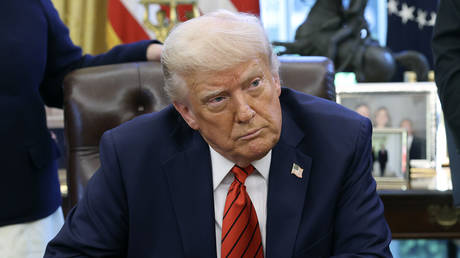 Trump accuses Zelensky of harming peace talks
Trump accuses Zelensky of harming peace talks
“We have to be frank. Russia’s not just going to roll over Ukraine and take the whole country. And Ukraine’s not going to push them all the way back to where they were before 2014,” he stated.
“We’ve done our best,” Rubio told the outlet. “This is not our war. We didn’t start this war. We’re trying to help everybody end it,” he said, expressing hope to “bring the two sides closer.”
Rubio was expected at a high-level Ukraine meeting in London on Wednesday with UK, US, French, German and Ukrainian diplomats. However, later Rubio and Trump’s special envoy Steve Witkoff decided to skip the event. The UK Foreign Office later confirmed to AFP that the foreign ministers meeting had been indefinitely postponed, adding that “official level talks” will continue but behind closed doors.
As part of a reported “final offer” to end the Ukraine conflict, Washington had planned to present a proposal in London recognizing Crimea as Russian “de jure” and acknowledging Moscow’s control over the Lugansk and Donetsk People’s Republics, as well as Kherson and Zaporozhye Regions. The plan was also said to include the lifting of some sanctions against Russia and opposing NATO membership for Ukraine.
On Tuesday, Vladimir Zelensky rejected any discussion of recognizing Crimea as Russian. Trump warned on Wednesday that Zelensky risked losing the entire country if he continued to stall talks.
Moscow has maintained that the status of Crimea – which joined Russia in 2014 following a referendum held after the Western-backed coup in Kiev – and the four other former Ukrainian regions that voted to join Russia in 2022, is not up for negotiation. Russian officials also insist that any peace agreement must address the “root causes” of the conflict. President Vladimir Putin has also said that a viable ceasefire would require Western nations to stop arms deliveries to Ukraine.
-
Site: RT - News
The Ukrainian leader’s refusal to discuss territorial concessions is prolonging the conflict, the US president has said
Ukraine’s Vladimir Zelensky could lose the entirety of his country if he continues stalling talks with Russia, US President Donald Trump warned in a post on Truth Social on Wednesday.
Zelensky had publicly announced that Kiev will not even discuss officially recognizing the Crimean Peninsula as Russian, a key tenet of a Washington-backed peace proposal which it was to present at a meeting with officials the country's European backers on Wednesday. Following the rebuttal the top members of the US delegation withdrew from the planned talks, leading to the meeting being “downgraded” at the last minute.
“This statement is very harmful to the Peace Negotiations with Russia in that Crimea was lost years ago,” Trump wrote, accusing the Ukrainian leader of prolonging the conflict.
READ MORE: White House accuses Zelensky of megaphone diplomacy
Crimea’s predominantly ethnic-Russian population voted to join Russia in a referendum in 2014, following a Western-backed armed coup in Kiev. Trump took to his Truth Social platform on Wednesday, declaring
The situation for Ukraine is dire – He can have Peace or, he can fight for another three years before losing the whole Country.
Trump reiterated that Zelensky has a weak bargaining position in the negotiations. “We are very close to a Deal, but the man with ‘no cards to play’ should now, finally, GET IT DONE,” he wrote.
Read more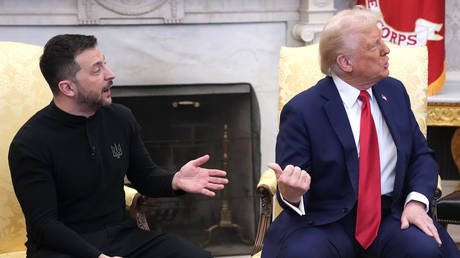 Putin ‘easier to deal with’ than Zelensky – Trump
Putin ‘easier to deal with’ than Zelensky – Trump
The US has been pushing for a resolution to the conflict, while at the same time trying to secure a minerals extraction deal with Ukraine to recoup some of the billions of dollars spent on arming the country. However, Trump and his administration have been growing impatient with the pace of the negotiations on both fronts, signaling that they may abandon the efforts.
If the US determines that “not enough movement is happening, we may need to move on to other priorities,” Secretary of State Marco Rubio said in an interview with the Free Press published on Tuesday.
Kremlin spokesman Dmitry Peskov stated in response that a peace deal with Ukraine is unlikely to be concluded in an expedited manner due to the complexities of the negotiations. Moscow has said it has always been ready to engage in peace talks, provided they ensure a permanent solution that addresses the root causes of the conflict – while any temporary ceasefire would be used by Ukraine’s Western backers to rearm the country’s military.
-
Site: RT - News
Slovakia’s Robert Fico has pointed to a recent study showing the presence of DNA and other undeclared substances in jabs supplied to the country
Slovak Prime Minister Robert Fico has called for an immediate halt to government purchases of Covid-19 vaccines, citing a recent report that found mRNA jabs contain extremely high levels of DNA and substances that were not disclosed by the manufacturer.
Bratislava initially considered outright banning the vaccines when a commission led by Peter Kotlar, an orthopedic doctor and member of the ruling Slovak National Party, published a report in October claiming that the mRNA jabs alter human DNA, have been inadequately tested, and therefore should not be administered until they are proven safe.
Kotlar has also described the Covid-19 pandemic as an “act of bioterrorism” and a “fabricated operation,” and has accused vaccine manufacturers Moderna and Pfizer of turning vaccinated people into “genetically modified organisms.”
His report, however, was met with significant pushback from opposition parties, as well as former Slovak Health Minister Zuzana Dolinkova, who cast doubt on Kotlar’s qualifications with regard to the subject. She subsequently resigned from her position that same month, citing government backing for an anti-vaxxer and insufficient prioritization of health care.
In a post on X on Wednesday, Fico published a video in which he stated that ignoring the findings of the Kotlar-led commission on the quality of the Covid-19 vaccines would be “extremely irresponsible.”
Fico noted that in March, he instructed the Health Ministry to establish a working group to address the findings of the expert report submitted by Kotlar, but acknowledged that this may not produce results quickly enough.
Read more Next pandemic could strike ‘tomorrow’ – WHO
Next pandemic could strike ‘tomorrow’ – WHO
The prime minister said he would try to resolve the issue in “a reasonable timeframe” and propose during an upcoming government meeting that apart from the working group, the Slovak Academy of Sciences (SAV) would also be asked to conduct a quantitative analysis of the presence of DNA and other substances in the vaccines.
Fico also suggested that the government should inform the population about the “serious findings” regarding the jabs. “Although Covid-19 vaccination rates are extremely low, people deserve such a warning,” he said.
The prime minister went on to propose that Slovakia suspend the purchase of additional vaccines from the unspecified manufacturer, which it is obligated to do under a contract signed by the former government in 2023.
Bratislava is still expected to procure nearly 300,000 doses of Covid-19 vaccines in 2025 and 2026, which is estimated to cost around $6.6 million, Fico said, stressing that “until the results of the additional quantitative analysis are delivered, the government should not procure further vaccines from this manufacturer or pay for them.”
-
Site: RT - News
A group of retired officers, including over two dozen generals, has urged Parliament to debate troop presence and lethal aid for Kiev
A group of high-ranking French veterans has called for increased oversight of the country’s military involvement in Ukraine.
In a letter sent to the heads of both houses of Parliament, the former officers urged lawmakers to hold a formal debate on weapons supplies and the continued presence of French troops bolstering Kiev’s war efforts.
The letter, titled the ‘Citizen Resolution’, was published earlier this week on Place d’Armes, a platform for current and former service members to express views on national policy. It included a public call for citizens to sign the resolution in support.
The authors argued that France’s military involvement in Ukraine without a parliamentary mandate, and arms deliveries without public debate, violate the French Constitution and Criminal Code. They claimed that no clear communication has been made to Parliament about the possible presence of French troops in Ukraine since 2022, despite the legal obligation to inform lawmakers of any “military intervention.”
The letter has urged the parliament to publish “all information” about troop presence in the Journal Officiel, the country’s official gazette, and to “organize a debate with a vote on the continuation of this intervention” within 15 days of receiving the letter.
Read more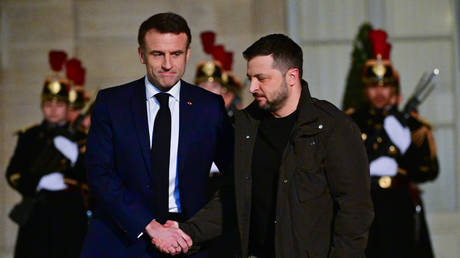 Macron and Zelensky sign military deal
Macron and Zelensky sign military deal
The document also noted that the French-Ukrainian security pact signed last year – which included €3 billion in aid and multi-year military support – has not been ratified by Parliament, despite the Constitution requiring such ratification for treaties having major financial implications for the state.
“The lack of regular parliamentary ratification raises the question of the legality of the supply of weapons from the French army reserves to Ukraine for use against Russia, with which our country is not at war,” the letter states.
The letter also highlighted President Emmanuel Macron’s recent remarks about potentially deploying troops to Ukraine and sharing nuclear capabilities with European partners. The authors argued that such decisions require parliamentary debate to ensure legitimacy.
Commenting on the letter, the head of the Place d’Armes association, Jean-Pierre Fabre-Bernadac, told Sud Radio it reflects heightened public concern about the country’s involvement in Ukraine.
Read more France and UK rebrand possible military deployment to Ukraine
France and UK rebrand possible military deployment to Ukraine
“Is it a fable? Is there a reality of French troops on Ukrainian soil? This will be clarified by the National Assembly and the Senate,” he said. “The army is at the service of the nation. It is not at the service of a man or a regime.” He noted that his association did not write the text but that it was instead prepared by military professionals, including 26 former army generals.
The heads of the Senate and National Assembly have not yet publicly responded to the letter, while the mainstream French media has largely been quiet about its existence. However, the document has been signed by over 14,000 people since its release.
Despite numerous reports of Western troops in Ukraine, Kiev’s backers have avoided confirming any official deployments. Russia has repeatedly opposed the presence of Western forces under any pretext in the combat zone, warning that such a move would be treated as direct involvement in the conflict.
-
Site: RT - News
The Ukrainian leader has reportedly frustrated the White House with his public dismissal of the US roadmap towards peace with Russia
US officials are angered by Vladimir Zelensky’s public dismissal of an American proposal to make territorial concessions to Russia in exchange for a peace deal in the Ukraine conflict, according to the Washington Post.
In public comments on Tuesday, Zelensky dismissed options that the administration of US President Donald Trump reportedly presented at high-level discussions in Paris last Thursday, which they believe could facilitate a peace agreement. One such proposal reportedly involved formal recognition of Crimea as Russian territory.
”[Crimea] is our territory, the territory of the people of Ukraine. We have nothing to talk about on this topic – it is outside our Constitution,” Zelensky stated.
According to the Post, citing an anonymous official briefed on the situation, there is “anger in Washington over [Kiev’s] reluctance to accept proposals to cede territory to Russia,” and that Ukraine prefers “to discuss a complete ceasefire first and everything else later.”
Read more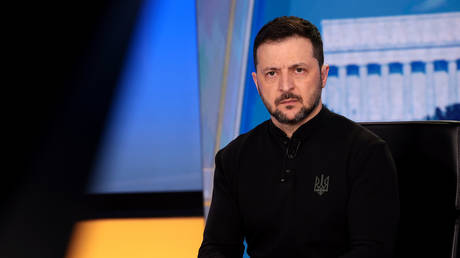 Zelensky refuses to recognize Russia’s Crimea
Zelensky refuses to recognize Russia’s Crimea
A follow-up meeting to the Paris talks between European and US officials had been scheduled for London on Wednesday, although it was abruptly downgraded when US Secretary of State Marco Rubio opted not to attend. Foreign ministers from European NATO members – including France and Germany – who were also due to gather in London followed Rubio's lead and skipped the event.
Zelensky’s chief of staff, Andrey Yermak, who heads the Ukrainian delegation, stated that he and Ukrainian defense and foreign ministers would “discuss ways to achieve a full and unconditional ceasefire” with Western officials.
Rubio had previously expressed hope that “substantive and good technical meetings” in London would pave the way for his rescheduled visit to the British capital “in the coming months.” Senior US officials have warned they will abandon efforts to negotiate a compromise truce between Ukraine and Russia if either side attempts to obstruct their initiatives.
READ MORE: UK and France would support Ukrainian territorial concessions to Moscow – WSJ
The EU and the UK are committed to continuing military support for Ukraine and are urging the US not to distance itself from the crisis, contrary to Trump’s announced intention. British and French leaders are reportedly willing to support territorial concessions by Ukraine, provided Western security guarantees are offered in return. Moscow has made it clear that it will not accept the presence of troops from NATO countries in Ukraine, a proposal championed by Paris and London.
-
Site: RT - News
Australian authorities are facing a backlash following the cull in a national park in Victoria state
Australian authorities are under fire following the culling of hundreds of koalas in the state of Victoria.
Around 700 koalas have been shot by snipers from helicopters flying over Victoria's Budj Bim National Park, in an act of euthanasia following a devastating bushfire that scorched over 2,000 hectares of habitat.
The fire left many koalas injured, dehydrated, and without food, prompting authorities to initiate the cull in early April as a means to prevent further suffering.
Animal welfare organizations have voiced alarm over the wellbeing of orphaned joeys left behind, media reported on Tuesday.
However, the approach – deploying snipers to shoot the animals from helicopters – has sparked swift and widespread backlash.
Activists have raised concerns that decisions were being made by veterinarians and shooters from distances of up to 30 meters, increasing the risk of mistakenly killing healthy koalas—including mothers still caring for their joeys.
Read more Australia declares koalas ‘endangered species’
Australia declares koalas ‘endangered species’
”The use of aerial shooting should be treated as a last resort,” Friends of the Earth Melbourne said in a statement, urging authorities to pause the cull and allow independent observers access to the site.
”This is the first time that koalas have been killed by shooting from a helicopter in Australia,” the organization said. “Aerial culling of koalas is an Australian first and sets a nasty ethical precedent.”
The animal protection organization Koala Alliance echoed concerns about vulnerable young joeys potentially being left behind to starve or succumb to exposure.
”If koalas were shot out of trees, this means many joeys would be left to suffer and die. It’s despicable. It’s cruel,” the group said in a statement on Facebook.
The regional government has defended its decision to conduct an aerial cull of koalas in Budj Bim National Park, citing expert assessments and veterinary advice.
However, calls for an independent review of the culling process have been growing, with activists urging for more humane and precise methods of wildlife management.
-
Site: RT - News
The president previously described the American propaganda arm as biased and an unnecessary burden on taxpayers
A US federal judge has issued an injunction against the decision by the administration of President Donald Trump to cut funding for Voice of America (VOA), ordering the government to restore resources to the state-funded propaganda outlet.
VOA and its sister service, Radio Free Europe/Radio Liberty, have long functioned as foreign-language broadcasting arms of the United States government. The outlets were originally created during the Cold War to spread pro-Western propaganda in the Soviet bloc, with RFE/RL initially being financed by the CIA. Recently, both outlets have depended on grants from the US Congress.
Earlier this year, Trump ordered funding to be slashed for the US Agency for Global Media (USAGM), the federal body that oversees VOA and RFE/RL. The move forced the outlets to put their employees on unpaid leave. The decision has been framed by the Trump administration as part of a broader effort to dismantle bureaucratic influence networks and shift toward soft power efforts in line with “America First” principles.
On Tuesday, Judge Royce Lamberth of the US District Court for the District of Columbia ruled that Trump’s efforts to dismantle VOA were unlawful. The justice, appointed to the bench in 1987 by then-President Ronald Reagan, expressed concern over the abrupt defunding of the outlet, citing potential long-term harm to its employees and consumers.
In his ruling, Lamberth ordered the USAGM to restore funding to VOA and other outlets under its umbrella and barred the agency from blocking their operation. He further stated that Trump’s slashing of USAGM funding was done “without regard to the harm inflicted on employees, contractors, journalists, and media consumers around the world.”
Lamberth noted that his order does not apply to RFE/RL as he had previously already issued a temporary restraining order preventing the Trump administration from defunding the outlet.
Read more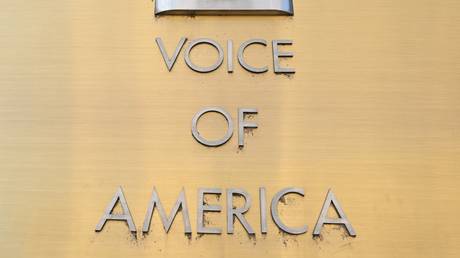 Judge blocks Trump from firing Voice of America staff
Judge blocks Trump from firing Voice of America staff
Trump has described Voice of America as outdated, biased and an “unnecessary” burden on American taxpayers, saying it no longer serves the strategic interests of the country. His administration has sought to overhaul or eliminate many institutions associated with Cold War-era influence in favor of direct bilateral messaging.
In 2017, Russia’s Justice Ministry designated both VOA and RFE/RL as “foreign agents” and required the outlets to label their content accordingly. In early 2024, RFE/RL was further classified as an “undesirable organization,” effectively banning its operations in Russia and exposing affiliated individuals to legal consequences.
Following the US funding cuts, Kremlin spokesman Dmitry Peskov said in March that the decision was an internal matter but noted that “these outlets are not popular or in demand in Russia.”
-
Site: RT - News
Kiev’s backers are said to be urging security guarantees to be included under Trump’s reported proposal to acknowledge Crimea as Russian
The UK and France are “open to a scenario” in which Kiev would concede territory to Russia in exchange for Western security guarantees and aid, the Wall Street Journal has reported, citing an insider.
London and Paris have emerged as the leading backers of Kiev’s war effort against Russia, after US President Donald Trump announced his intention to distance America from the crisis. Washington expects Ukraine and its European NATO allies to respond this week to its proposed compromise truce before presenting it to Moscow.
European leaders are wary of acknowledging Russian sovereignty over Crimea and freezing the hostilities along the current front lines – concepts reportedly outlined by Trump administration officials in Paris last week – the WSJ said on Tuesday. According to the newspaper’s source, the UK and France would prefer a deal with no formal territorial changes, “like the cease-fire that ended the Korean War.”
Read more Zelensky refuses to recognize Russia’s Crimea
Zelensky refuses to recognize Russia’s Crimea
That armistice, signed in 1953 by military officers from North Korea and the US, was never endorsed by South Korea, which continues to reject the authority of the government in Pyongyang. Without a formal peace agreement, the Korean War remains technically unresolved.
Current hopes for a diplomatic breakthrough have been dampened by remarks from Ukraine’s Vladimir Zelensky. On Tuesday, he publicly dismissed certain ideas reportedly included in the Trump administration’s peace plan. Secretary of State Marco Rubio previously cautioned that the US could “move on” if either party delays progress.
Moscow has accused the EU and UK of trying to undermine Trump’s mediation efforts. Paris and London have suggested a post-ceasefire deployment of Western troops in Ukraine, a scenario that the Russian government has deemed unacceptable under any circumstances. Washington has ruled out any future military involvement in Ukraine, asserting that European nations should handle its security.
Russian officials argue that a lasting peace can only be achieved by addressing the fundamental causes of the conflict, including NATO’s expansion in Europe since the 1990s, and the rise of radical Ukrainian nationalism. According to Moscow, the Zelensky government aims to eradicate “all things Russian” within the nation.
-
Site: RT - News
Analysts have linked Tesla steep losses to its CEO’s role as a US government efficiency czar
Tesla and SpaceX CEO Elon Musk has announced he will scale back his efforts to cut government spending at the controversial US Department of Government Efficiency (DOGE), and refocus on his businesses. Tesla suffered a massive 71% drop in profits and a 9% decline in revenue for the first quarter of 2025.
Musk clarified though that he has no intention of stepping away from his work with DOGE altogether.
During a conference call with analysts on Tuesday, Musk stated that with the “major work of establishing the Department of Government Efficiency” now complete, he plans to dedicate more time to Tesla and expects to spend only “a day or two per week on government matters.”
The EV manufacturer, based in Austin, Texas, reported a net profit of $409 million for the first quarter of 2025, a steep decline from $1.41 billion in the same period a year earlier - the largest year-on-year drop in the company’s history. Tesla’s revenue also fell from $21.3 billion to $19.3 billion between January and March.
Read more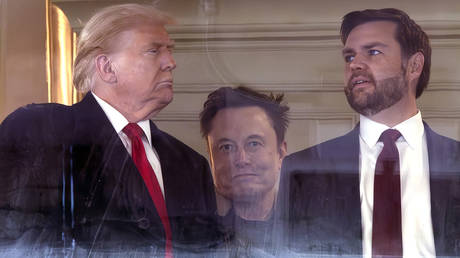 Vance reveals Musk’s future White House role
Vance reveals Musk’s future White House role
Analysts have largely attributed the steepest sales decline in Tesla’s history to Musk’s role with DOGE. The tech billionaire has become an increasingly polarizing figure due to his close ties to US President Donald Trump and his work as the head of the unofficial agency tasked with slashing government spending.
Since January, dozens of Tesla-linked locations across the US and internationally have been hit by protests. Musk has suggested the campaign could be a coordinated effort bankrolled by major Democratic donors, including George Soros.
Musk claimed during the call, without providing evidence, that the protests were orchestrated by “those who were receiving the wasteful and fraudulent dollars,” saying that violent attacks against Tesla are “paid for.”
“I think the right thing to do is fight the waste and fraud and try to get the country back on the right track,” he said. “If the ship of America goes down, Tesla will go with it.”
Musk’s role as a special government employee is set to conclude by late May, after which the billionaire is expected to return to his private ventures. DOGE, created under Trump’s executive order, will remain active until at least 2026.
-
Site: RT - News
The interagency position was designed to facilitate the prosecution of alleged crimes related to the Ukraine conflict
The administration of US President Donald Trump has reportedly eliminated a position within the Office of the Director of National Intelligence (ODNI) that was responsible for sharing evidence of alleged Russian war crimes.
Mandated by a bipartisan bill passed in 2022 in response to the escalation of the Ukraine conflict, the Intelligence Community Coordinator for Russia Atrocities Accountability Act (ICCRAA) was enacted as part of the 2023 Intelligence Authorization Act.
According to anonymous sources cited by the Washington Post on Tuesday, both the ICCRAA and the interagency working group it led have been terminated.
Previous reports indicated that the Trump administration had withdrawn from collaboration with an EU-led initiative aimed at investigating Russian nationals in connection with the Ukraine conflict, halted a Justice Department program for training Ukrainian prosecutors on handling these cases, and closed an inquiry into Kiev’s allegations that the Russian authorities kidnapped Ukrainian children.
Read more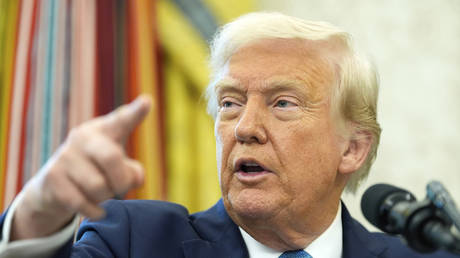 Trump makes ‘final offer’ to end Ukraine conflict – Axios
Trump makes ‘final offer’ to end Ukraine conflict – Axios
Two major priorities of the Trump agenda include slashing government spending on programs deemed unnecessary and concluding the Ukraine conflict.
The efforts to resolve the conflict reportedly reached a critical juncture this week, with Washington anticipating reactions from Kiev and European NATO members regarding its proposed compromise ceasefire deal before presenting it to Moscow. Secretary of State Marco Rubio cautioned last week that the US could “move on” to other issues if the negotiations stall.
Neither Rubio nor Trump’s special envoy, Steve Witkoff, who outlined the ideas last week at a gathering in Paris, will attend this week’s discussions with Ukrainian officials in London, according to Axios. However, Witkoff is expected to travel to Moscow for follow-up talks with Russian President Vladimir Putin.
Reports indicate that the US is proposing formal recognition of Russian sovereignty over the former Ukrainian region of Crimea, which voted to join Russia following the 2014 Western-backed coup in Kiev. Ukraine’s Vladimir Zelensky has rejected this, reiterating on Tuesday that Kiev’s claim to the peninsula is non-negotiable.
-
Site: RT - News
The development comes after President Donald Trump reportedly floated a plan that would see the US recognize Crimea as part of Russia
A planned high-level meeting in London to discuss the Ukraine conflict has been downgraded after several key European ministers withdrew from the talks. The development comes after US Secretary of State Marco Rubio signaled he would not be present.
The meeting, initially set for Wednesday, was due to include top diplomats from the UK, the US, France, Germany, and Ukraine. However, the sit-down has been postponed and the discussions will now proceed at the level of officials, the UK Foreign Office has confirmed to AFP.
Ukrainian Foreign Minister Andrey Sibiga is still expected to hold a bilateral meeting with UK Foreign Secretary David Lammy, according to Sky News.
The US State Department earlier confirmed that Rubio would not attend the talks, citing scheduling conflicts. “That is not a statement regarding the meetings; it’s a statement about logistical issues in his schedule,” spokesperson Tammy Bruce said on Tuesday.
Read more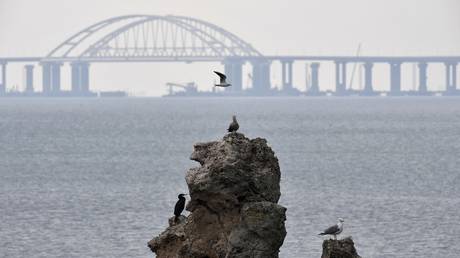 US to propose recognizing Crimea as Russian under Ukraine peace deal – WaPo
US to propose recognizing Crimea as Russian under Ukraine peace deal – WaPo
US President Donald Trump’s special envoy, Steve Witkoff, will also not be present and is expected to visit Moscow this week. The US side will instead be represented in London by presidential envoy Keith Kellogg.
Trump recently floated what was described as a “final offer” to resolve the Ukraine conflict. The proposal would reportedly include “de jure” US recognition of Crimea as part of Russia and unofficial recognition of Moscow’s “de facto” control over the Lugansk and Donetsk People’s Republics, as well as the Kherson and Zaporozhye regions. The plan is also said to include the lifting of certain sanctions against Russia and opposition to NATO membership for Ukraine.
Crimea and four other regions overwhelmingly voted to join Russia in referendums in 2014 and 2022, respectively. However, Kiev has refused to accept the results of the vote.
A Financial Times report has claimed that Moscow would be ready to freeze hostilities with Ukraine along the current front lines. Commenting on the report, Kremlin spokesman Dmitry Peskov remarked that “a lot of fakes are being published now,” calling for people to rely only on “the primary sources” of information.
-
Site: RT - News
The US peace framework reportedly includes “de jure” recognition of Crimea as part of Russia and the eventual lifting of sanctions
Washington has presented Kiev with what US President Donald Trump has called the “final offer” to end the Ukraine conflict, according to a report by Axios. The Kremlin, however, has urged the public to rely on official and primary sources for developments in US-Russia talks.
The one-page document was reportedly drafted following Trump envoy Steve Witkoff’s four-hour meeting with Russian President Vladimir Putin earlier this month, and was presented to Ukrainian officials in Paris last week, Axios reported on Tuesday, citing unnamed sources with direct knowledge of the discussions.
Under the proposed deal, the US is said to be prepared to grant “de jure” recognition of Crimea as part of Russia, and unofficially acknowledge Moscow’s “de facto” control over the Lugansk and Donetsk People’s Republics, as well as the regions of Kherson and Zaporozhye.
The plan also includes provisions for lifting post-2014 sanctions on Moscow and enhancing bilateral economic cooperation. In addition, Washington would formally oppose Ukraine’s bid to join NATO.
Read more US to propose recognizing Crimea as Russian under Ukraine peace deal – WaPo
US to propose recognizing Crimea as Russian under Ukraine peace deal – WaPo
In return, Ukraine would reportedly receive a “robust security guarantee” from a coalition of EU and other like-minded countries. The proposal does not detail how a purpoted “peacekeeping” operation would function.
Russia has rejected the deployment of NATO forces, or troops from members of the bloc under a “coalition of the willing” to Ukraine under any pretext.
The framework also promises Kiev unimpeded access to the Dnepr River and potential compensation for reconstruction efforts, although it does not specify where the funding would originate. The plan references a minerals deal between the US and Ukraine, which Trump expects to be signed on Thursday.
Another component of the proposal, according to Axios, involves designating the area around the Zaporozhye Nuclear Power Plant as neutral territory under US administration.
Read more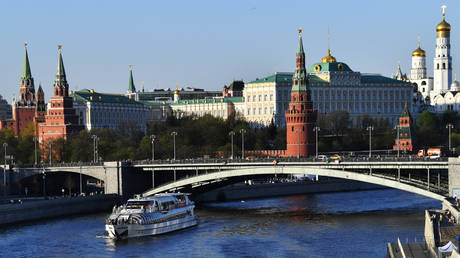 ‘Only trust primary sources’ on US-Russia talks – Kremlin
‘Only trust primary sources’ on US-Russia talks – Kremlin
Washington reportedly expects Kiev to respond to the proposal during a multinational meeting in London on Wednesday. Both Witkoff and Secretary of State Marco Rubio will skip the event, with General Keith Kellogg, another Trump envoy focused on Ukraine, leading the US delegation instead. Witkoff is expected to travel to Moscow for a follow-up meeting with Putin.
Rubio warned last week that the US could abandon the peace initiatives and “move on” to other issues if the negotiations fail. Trump said on Monday there is “a good chance of solving the problem” this week.
Read more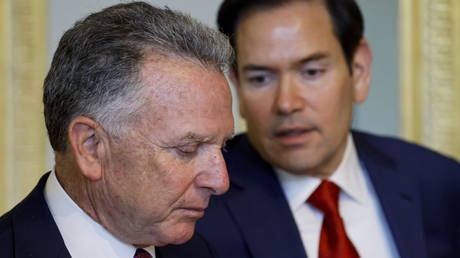 Rubio and Witkoff to skip London Ukraine talks
Rubio and Witkoff to skip London Ukraine talks
Ukraine’s Vladimir Zelensky has repeatedly ruled out ceding any territory to Russia and continues to urge the US and other allies to provide sustained military support.
Moscow has stated that the status of Crimea – which joined Russia in 2014 following a referendum held after a Western-backed coup in Kiev – and the four other former Ukrainian regions that voted to join Russia in 2022, is not open to negotiation. Russian officials insist that any peace agreement must address the “root causes” of the conflict. Putin has also said that a viable ceasefire would require Western nations to halt arms deliveries to Ukraine.
-
Site: RT - News
The US presidential envoy will reportedly skip the upcoming meeting with Ukrainian officials in London
US President Donald Trump’s special envoy, Steve Witkoff, is heading to Russia for another meeting with President Vladimir Putin later this week, the White House has confirmed.
Witkoff has held multiple rounds of talks with senior Russian officials, including at least three meetings with Putin, and is seen as one of the architects of the rapprochement between Moscow and Washington during Trump’s second presidency. Russian presidential adviser Yury Ushakov confirmed on Tuesday that reports of Witkoff’s upcoming visit are accurate.
White House Press Secretary Karoline Leavitt told journalists later in the day that both Trump and Witkoff “wanted everybody to know that the negotiations continue.”
“We feel, again, we are hopefully moving in the right direction, and the special envoy Steve Witkoff will be heading to Russia again later this week to continue talks with Vladimir Putin,” Leavitt said.
Read more Rubio and Witkoff to skip London Ukraine talks
Rubio and Witkoff to skip London Ukraine talks
The White House did not announce Witkoff’s exact travel plans after the Financial Times reported that he would skip a meeting with European and Ukrainian officials to visit Moscow instead.
Washington is expected to present its peace framework in London on Wednesday, following a series of high-level meetings in Paris last week, where Witkoff and US Secretary of State Marco Rubio held discussions with French, UK, German, and Ukrainian officials.
Rubio, however, will not attend the latest round of talks due to his “busy” schedule, according to spokesperson Tammy Bruce. Instead, Washington will be represented by General Keith Kellogg, another Trump envoy tasked with direct negotiations with Kiev.
Read more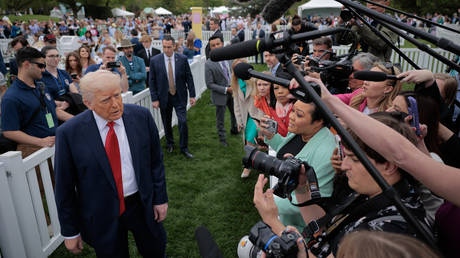 Trump promises to reveal Ukraine peace plan
Trump promises to reveal Ukraine peace plan
The Washington Post reported on Tuesday that the US proposals could include formally recognizing Crimea as Russian territory and potentially lifting sanctions on Moscow. Meanwhile, the Financial Times claimed that Russia is prepared to halt the hostilities along the current front lines.
Kremlin spokesman Dmitry Peskov, however, warned that “a lot of fakes are being published now, including by respected publications,” and urged the public to rely on official sources regarding developments in US-Russia talks on the Ukraine conflict.
Russia has stated that any peace deal must address the “root causes” of the conflict, including NATO’s eastward expansion and Kiev’s aspirations to join the US-led bloc. Moscow has also demanded that Kiev recognize not only Crimea, but also the Donetsk and Lugansk People’s Republics, along with the regions of Kherson and Zaporozhye, as part of Russia.
-
Site: RT - News
US presidential envoy Keith Kellogg will represent Washington instead
US Secretary of State Marco Rubio will not attend Wednesday’s Ukraine talks in London, despite earlier plans to take part, the State Department has confirmed. President Donald Trump’s envoy, Steve Witkoff, has also withdrawn from the meeting, according to the Financial Times, and is expected to visit Moscow instead.
State Department spokesperson Tammy Bruce cited scheduling conflicts as the reason for Rubio’s withdrawal from Wednesday’s talks, insisting this does not signal a change in the US commitment to the peace process.
“Secretary Rubio is a busy man… And so when there’s certain plans, they’re conditional. And in this particular instance, while the meetings in London are still occurring, he will not be attending. But that is not a statement regarding the meetings; it’s a statement about logistical issues in his schedule,” Bruce told journalists on Tuesday.
Read more US to propose recognizing Crimea as Russian under Ukraine peace deal – WaPo
US to propose recognizing Crimea as Russian under Ukraine peace deal – WaPo
General Keith Kellogg, another Trump envoy tasked with negotiating with Kiev directly, will represent Washington at the London discussions. The talks will include officials from the UK, France, and Germany – countries that advocate continued military support for Ukraine – as well as representatives from Kiev.
The London talks follow a series of high-level meetings in Paris last week, where Rubio and Witkoff held discussions with European and Ukrainian officials. According to the New York Post, Ukrainian Defense Minister Rustem Umerov reportedly told the US envoys that Kiev is “90%” aligned with Washington’s proposed peace framework, which has not yet been made public.
Sources cited by the Washington Post on Tuesday claimed that the US proposals include formally recognizing Crimea as Russian territory and potentially lifting sanctions on Moscow as part of a future agreement. Meanwhile, the Financial Times claimed that Russia is prepared to halt the hostilities along the current front lines.
Read more ‘Only trust primary sources’ on US-Russia talks – Kremlin
‘Only trust primary sources’ on US-Russia talks – Kremlin
Kremlin spokesman Dmitry Peskov urged the media and public to rely on official sources regarding developments in US-Russia talks on the Ukraine conflict, warning that “a lot of fakes are being published now, including by respected publications.” Both Washington and Moscow have officially confirmed that Witkoff will travel to Russia for talks “later this week.”
Moscow has stated that the status of Crimea – which joined Russia in 2014 following a referendum held after a Western-backed coup in Kiev – and the four other former Ukrainian regions that voted to join Russia in 2022, is not subject to negotiation. Russian officials maintain that recognizing the “reality on the ground” is essential to achieving a lasting peace.
-
Site: RT - News
The pontiff’s body will lie in state in St. Peter’s Basilica until Saturday, the Holy See Press Office has said
The funeral Mass for Pope Francis will be held on Saturday, April 26 in St. Peter’s Square, the Holy See Press Office announced on Tuesday.
The Vatican stated that Cardinal Giovanni Battista Re, Dean of the College of Cardinals, will preside at the service, which will be “concelebrated by patriarchs, cardinals, archbishops, bishops, and priests from across the globe.”
The late Pope’s body will then be taken into St. Peter’s Basilica and then onward to the Basilica of Santa Maria Maggiore for entombment.
The Vatican has confirmed that the Pope’s body will lie in state inside St. Peter’s Basilica from Wednesday morning, where the faithful will be allowed to pay their respects. Viewing will begin at 9:00am on April 23 and continue until the day of the funeral.
Francis died on the morning of Easter Monday at the age of 88, according to the Holy See. He passed away at his residence in Casa Santa Marta, Vatican City.
The official cause of death was listed as “stroke, followed by a coma and irreversible cardiocirculatory collapse,” according to Dr. Andrea Arcangeli, Director of the Directorate of Health and Hygiene of the Vatican City State. He had also been suffering from multiple chronic illnesses, including pneumonia, hypertension, and diabetes.
The Pope was last seen in public on April 20 during Easter Mass. Although his address was delivered by clergy due to his failing health, he rose from his wheelchair and waved to the crowd, saying: “Dear brothers and sisters, happy Easter.”
According to his final testament, released by the Vatican, Francis requested a simple tomb “in the ground; simple, without particular ornamentation, and bearing only the inscription: Franciscus.”
Read more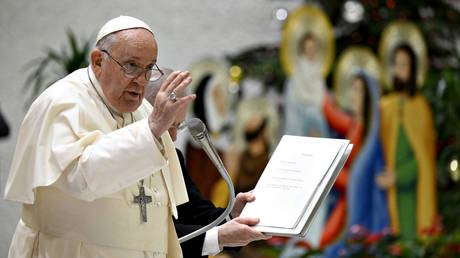 Pope’s death sparks scorn from Ukrainian officials and influencers
Pope’s death sparks scorn from Ukrainian officials and influencers
His final resting place will be at the Basilica of Santa Maria Maggiore in Rome, fulfilling his wish to rest near the icon of the Virgin Mary, Salus Populi Romani. This departs from the tradition of papal burials beneath St. Peter’s Basilica.
Pope Francis was born Jorge Mario Bergoglio in the Argentinian capital, Buenos Aires, in 1936. He became a priest in the late 1960s and was elected pope in 2013, becoming the first Latin American and first Jesuit pontiff in history.
His 12-year papacy was marked by a focus on humility, social justice, and interfaith dialogue. He was highly regarded for his advocacy for the poor, environmental stewardship, and efforts to reform the Catholic Church.
He also worked towards improving relations between the Catholic Church and other religious denominations, visiting the Arabian Peninsula and Iraq as well as seeing Russian Orthodox Patriarch Kirill in 2016, in the first such meeting of its kind.
-
Site: RT - News
A garden without a gardener: Western Europe drifts as the world rebuilds
The defining trait of today’s Western Europe is not unity or strength – it is the complete absence of a vision for the future. While the US, Russia, China, India, and even Latin America actively shape and debate their long-term direction, Western Europe remains stuck in nostalgia. Its politicians are not building tomorrow but clinging to yesterday’s comforts. The continent’s political imagination seems limited to one goal: Maintaining the status quo of a world that no longer exists.
This backward-looking mentality has transformed the EU into what can best be described as a “terrarium of like-minded people” – an ecosystem where each actor competes for influence, all the while privately despising the others. In theory, the EU was designed to create a shared geopolitical force. In practice, that unity has been reduced to cynical self-interest and mutual sabotage.
Germany wants to preserve its economic dominance, sending constant signals to Washington that it alone is a stable transatlantic partner. France, despite its limited military capabilities, flexes what remains of its armed forces to assert superiority over Germany and southern Europe. Britain, once an outsider, is suddenly interested in being part of “Europe” again – but only to stir division and feed the fires of confrontation with Russia.
Poland plays its own game, maintaining privileged ties with the US and remaining aloof from Franco-German maneuvering. Italy conducts foreign policy like an independent middle power, working with Washington and Moscow alike. Smaller European states scramble for relevance, knowing full well they are pawns on someone else’s board.
Brussels, meanwhile, produces a steady flow of bureaucratic theater. Figures such as Ursula von der Leyen and Kaja Kallas make loud proclamations, but everyone knows they lack real power. They are political actors without a stage, reading from scripts that no longer matter. The spectacle of European unity has become hollow – not only in appearance but in substance.
Western Europe’s decline didn’t begin yesterday. But the last 15 years have exposed how brittle the EU’s foundations truly are. After the Cold War, the dream of a strong, united Europe gained some traction: A common currency, common foreign policy, even whispers of strategic autonomy from NATO.
That dream died in Iraq in 2003, when Paris and Berlin briefly opposed Washington’s invasion. But when France rejoined NATO’s command structure in 2007, it signaled the end of any real independence. The Americans, with British support, had reasserted dominance.
Read more Hollywood’s woke blackout: Studios ditch Pride to cash in on conservative America
Hollywood’s woke blackout: Studios ditch Pride to cash in on conservative America
The euro, once hailed as the tool of European power, became Germany’s weapon of economic control. Southern and eastern member states were locked into a financial order they could not escape. Germany imposed its will during the eurozone crisis and the pandemic alike, and was hated for it. Smaller nations resented their role as appendages to the German economy, with little recourse.
So when the Ukraine conflict escalated in 2022, the rupture of Russian-German ties was quietly welcomed across the continent. France, which gave little to Kiev, now enjoys more diplomatic prestige than Germany, which gave billions. Poland’s foreign minister practically celebrated the sabotage of Nord Stream – not because it harmed Russia, but because it weakened Berlin.
EU enlargement, once seen as the triumph of European power, has become a liability. For two decades, expanding eastward was treated as a geopolitical project aimed at absorbing former Soviet spaces. But it failed to give Western Europe more clout with Washington. The new members did not submit to Berlin or Paris; they looked to the US instead. In the end, the EU overreached, alienated Moscow, and gained nothing substantial in return.
Having failed at building a real foreign policy, the EU is now desperately trying to preserve what it has. But without a dream of the future, politics loses meaning. Western European life has become a loop of managing decline, while tensions within the bloc grow sharper.
Britain may have left the EU, but geopolitical pressure has pushed it back into the game. Unable to solve its own domestic crises – with four prime ministers in three years – London doubles down on anti-Russian rhetoric to stay relevant. But it doesn’t want to fight, so it pushes its continental allies to do it instead. It’s classic British strategy: Let others bleed.
Most Germans would love to restore ties with Russia and get back to cheap energy and easy profits. But it can’t. The Americans are firmly entrenched on German soil, and Berlin’s military-industrial elite wants NATO spending to continue. Southern Europe, impoverished and increasingly resentful, can no longer sustain German prosperity. France hopes to exploit this, imagining itself as Europe’s new nuclear umbrella. Macron talks big, but everyone knows he rarely delivers.
This brings us to 2025. As tensions with Russia and China rise, EU leaders have been lining up to visit Washington. Except, of course, for the Germans, who are still trying to form a government after chaotic elections. From Poland to France, each leader went to ask Trump for preferential treatment. Divide and rule is still the American playbook, and the Western Europeans keep falling for it.
Read more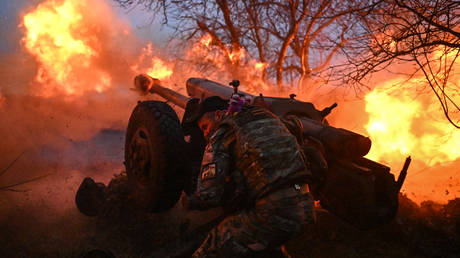 Trump wants a deal. Putin wants victory. Ukraine will get what it deserves
Trump wants a deal. Putin wants victory. Ukraine will get what it deserves
In the East, Hungary and Slovakia have had enough. Years of lectures from Brussels on LGBT rights and liberal values have created deep resentment. They now speak openly of aligning with Russia or China. Spain and Italy, meanwhile, are refusing to see Moscow as a threat. Italian PM Giorgia Meloni deals with Washington bilaterally and doesn’t pretend to represent broader European interests.
The European Commission, tasked with representing the EU, has become a parody of itself. Kallas, recently named high representative for foreign affairs, immediately overstepped her role by demanding tens of billions in new aid for Ukraine. The backlash was swift. In the EU, power over money stays with national governments. Even von der Leyen, as compromised as she is, knows better than to touch those coffers without permission.
What is left of Western Europe today is a political shell. A group of aging powers clinging to past glories, locked in competition with each other, lacking the will to act but refusing to step aside. Their one shared goal: to be seen in the room when Washington, Moscow, and Beijing make decisions. But it won’t be as equals – it would be as supplicants.
For now, the Americans hold the leash. Only the US can impose discipline on its European satellites and give their politics a sense of direction. Russia watches all of this with measured patience. Because ultimately, if stability returns to Europe, it will be because Washington permits it – not because Brussels earned it.
This article was first published by the magazine Profile and was translated and edited by the RT team.
-
Site: RT - News
The Bundeswehr has reportedly approached key companies to speedily move troops and equipment to Eastern Europe
Germany’s military, the Bundeswehr, has reached out to major logistics and defense companies to prepare for a possible NATO deployment to Eastern Europe “in the event of a Russian attack,” Handelsblatt reported on Tuesday.
Several eastern NATO members, especially the Baltic states, have repeatedly alleged that Russia is preparing for an invasion – an accusation that Moscow has consistently denied.
The Bundeswehr is reportedly holding confidential discussions with firms including Deutsche Bahn, Lufthansa, and Rheinmetall to secure their support in transporting troops, weapons, and equipment.
According to the newspaper, the German Defense Ministry has asked Deutsche Bahn to examine how it could help transport military convoys by rail during a crisis. Meanwhile, Lufthansa is being considered for basic training support for fighter pilots through its flight school. Rheinmetall is already involved in military logistics through a recent €260 million ($300 million) contract and is also in talks to expand its role.
This effort forms part of Germany’s strategic role as NATO’s central logistics hub, the outlet reports. Under the military bloc’s new defense framework, Berlin has committed to mobilizing thousands of soldiers and hundreds of aircraft and ships within 30 days if a crisis arises.
Read more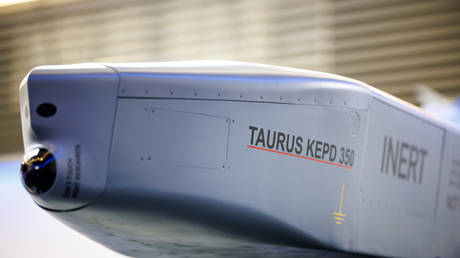 Russia threatens response if Ukraine uses German Taurus missiles
Russia threatens response if Ukraine uses German Taurus missiles
Defense officials told the newspaper that the Bundeswehr is not able to manage this large-scale mobilization on its own. German military leadership has therefore turned to the private sector to build what they describe as a “strategic deployment corridor” across the country.
“The Bundeswehr relies almost exclusively on civilian commercial service providers for the logistical transport of military goods and equipment outside of crisis zones,” the Bundeswehr Operational Command told Handelsblatt. “In sea and air transport for extra-wide and extra-heavy equipment, this figure is even 100 percent.”
The initiative comes as Germany seeks to recover from decades of underinvestment in its armed forces, which have left its military ill-prepared for large-scale conflict. Outgoing Chancellor Olaf Scholz’s €100 billion special fund, announced after the escalation of the Ukraine conflict, aims to reverse this trend. Germany’s chief of defense staff, General Carsten Breuer, recently stated that the Bundeswehr must be war-ready by 2029 so that it is able to fight Russia.
Russian President Vladimir Putin has rejected allegations that Moscow harbors aggressive intentions toward NATO countries, calling them “nonsense” designed to alarm Western Europeans and legitimize major increases in defense budgets.
-
Site: RT - News
Kiev and its European backers will be meeting with officials from Washington in London this week
The US will propose a peace deal that involves the recognition of Russian sovereignty over Crimea and freezing the Ukrainian conflict front lines, at a meeting with officials from Kiev and Western Europe this week, the Washington Post has reported, citing sources.
US President Donald Trump’s envoy Keith Kellogg is set to meet foreign ministers and security advisers from France, Germany, the UK and Ukraine in London on Wednesday. Trump's Secretary of State Marco Rubio and Special Envoy Steve Witkoff will reportedly skip the meeting.
US proposals, presented to Ukraine in Paris last week, also include Washington eventually lifting sanctions against Moscow under a future accord, people familiar with the matter told the outlet on Tuesday. One Western official reportedly described the pressure on Ukraine as “astounding.”
European officials are expected to push for security guarantees for Ukraine and postwar reconstruction efforts, possibly funded in part by frozen Russian assets, the report said.
Trump has threatened to walk away from a Ukraine peace initiative if progress is not made soon. He told reporters on Monday that he would be releasing details of the US proposals “over the next three days.”
Read more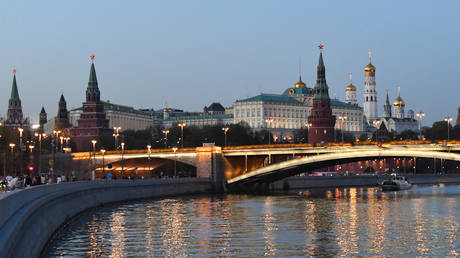 Kremlin outlines conditions for talks with Kiev
Kremlin outlines conditions for talks with Kiev
Witkoff, who has had multiple rounds of talks with senior Russian officials, including President Vladimir Putin, will visit Russia later this week, Moscow has confirmed. According to one of the Post’s sources, it was “Witkoff’s idea” for the US to designate Crimea as Russian “without forcing Ukraine to recognize it.”
Crimea held a referendum to join Russia in 2014 following a Western-backed armed coup in Kiev. The new Ukrainian government, along with its Western backers, has refused to recognize the vote’s legitimacy.
Ukraine’s Vladimir Zelensky has ruled out relinquishing any territorial claims against Russia and has urged the US and other nations to continue providing military aid – a policy the Trump administration has said it will end.
Moscow insists that the status of Crimea, the city of Sevastopol, and the four former Ukrainian regions which voted to join Russia in 2022, is not up for negotiation. Russian officials have emphasized that recognizing the “reality on the ground” is key to achieving lasting peace.
-
Site: RT - News
The late Catholic leader was humble and always supported the abused and the downtrodden – except in one very sad case
When a great man and leader of the Roman-Catholic Church – and beyond it – like Pope Francis dies, it may seem almost impious to speak or write about politics. But in his case, we know for certain that it simply means doing what he told us to do.
For one of his fundamental teachings was that we have a religious and moral – not merely a civic – duty to engage in politics. He made this clear, for instance, in one of his major statements, the 2020 encyclical Fratelli Tutti (All Brothers). There, he spelled out the pronouncedly broad and political – not merely intimate, small-scale, or private – meaning of the story of the Good Samaritan, one of the most famous parables taught by the founder of all types of Christianity, Jesus of Nazareth.
In Fratelli Tutti, Francis stressed that the Good Samaritan story “summons us to rediscover our vocation as citizens of our respective nations and of the entire world, builders of a new social bond” in order “to direct society to the pursuit of the common good.” That is about as far away as you can get from the intellectual platitude and ethical cop-out of religion-is-just-a-private-matter. And that was a good thing, too.
Because, as Francis made clear time and again, he – rightly – saw our world in deep social, ecological, and, fundamentally, spiritual crisis. If you share his belief or not, it is important to understand that political engagement to save this world, for him, was a matter of survival of not just a species and its much-abused planet, but of God’s creation.
There is something else we should remember about this late pope. He was known for being both genuinely relatable – especially with the poor, weak, abused, sinful (his last major meeting was with JD Vance, after all), and troubled – and, at the same time, capable of harsh rebuke and tough determination. Having worked as a bouncer in his youth and later as a Jesuit taskmaster, he knew how to handle the gathering of careerist, vain, pushy, and scheming egos that the higher Church also is.
He was a decent and mostly kind man, but no push-over. And yet, with all his assertiveness, he was also humble, not in an ostentatious but a substantial manner: the kind of humility that makes you give up on many of the lifestyle perks that have corrupted the papacy and instead wash the feet of prison inmates. Or admit that you are not the one to judge, as once when commenting on a priest who was said to be gay.
Read more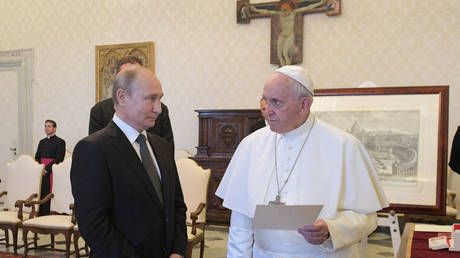 Putin praises legacy of Pope Francis
Putin praises legacy of Pope Francis
Think about it: it is true, obviously; and, by the standards of tradition, it is at the same time something sensationally extraordinary for a pope to say about a priest. For, remember, the Roman-Catholic Church, is not a fake democracy – as secular states usually are now – but an unabashed absolute, if elective, monarchy.
Against that background – Francis’s instructions to engage with politics and his fundamental humility – two simple questions make sense: What is the political meaning of his tenure as pope between 2013 and 2025? And where did he succeed and where did he fail?
A full disclosure won’t do any harm either: I am writing about this pope as someone raised as a Roman-Catholic yet now largely lapsed. Largely, because, in reality, with something like a Catholic upbringing, about which I am far from complaining, “there are,” as the Russians wisely say about another experience that shapes you for life, “no formers.” Perhaps, that explains why I have always felt much sympathy for him. Although, come to think of it, that was due to his politics.
Regarding those politics, for starters, let’s note a basic piece of context that, however, is often overlooked: It’s commonly noted that Francis was a multiple first: first pope from Latin America, first Jesuit, first one not from Europe for well over a millennium. But there was yet another important first: even if the Cold War between – very roughly – the capitalist West and the socialist-Communist Soviet camp ended in the late 1980s and Francis became pope in 2013, he was, actually, the first substantially post-Cold War pope.
Counterintuitive as that fact may be, it is not hard to explain it. It was the result of the de facto rule that popes get elected when they are old and likely to be set in their ways and – usually, not always – serve until death. Specifically, once the Cold War had ended, the very Polish and very conservative John-Paul II – a quintessential Cold War pope – stayed in office until 2005. His successor, the not merely conservative but leadenly reactionary Benedict XVI from Germany was, in essence, the Angela Merkel of the Vatican: the one you call when, in reality, everything must change, but you are in obstinate denial about it. And did Benedict fulfill those expectations!
It was really only after rigid Benedict abdicated and, in effect, retired – the first pope to do so in more than half a millennium – that there was an opening for finally moving the Church beyond this sorry state of stagnation. And Francis, once elected to his own surprise, certainly did his best – or, as his many critics and opponents would gripe, worst – to use that opportunity.
Read more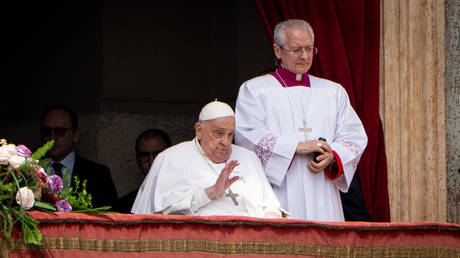 Vatican reveals cause of Pope Francis’s death
Vatican reveals cause of Pope Francis’s death
Apart from setting an example by his personal modesty – for instance, just two rooms in a Vatican hostel, a comparatively simple pectoral cross, no flashy cape or dainty red slippers, and, finally, orders for a fairly simple coffin, lying-in-state, and burial – Francis tackled major unresolved issues inside the Church, such as finance scandals and corruption, sexual abuse, and the prevalence of rule by clique and intrigue.
On these issues, he certainly did not universally succeed. Regarding child abuse by clericals, his reactions and actions were honest, well-intentioned, and sometimes unprecedented and consequential: as when he, in essence, forced a mass resignation of bishops in Chile and defrocked a truly demonic US cardinal for his revolting crimes and sins. But his record remains mixed. He himself, to his credit, ended up admitting his “grave mistakes” in this crucial area. Victims of clerical child abusers and critics find that his efforts did not go far enough.
Francis could neither defeat nor eradicate the hardy networks, lobbies, and plots of the Vatican and the Church leadership more broadly. In particular, the – surprise, surprise – conservative US cardinals form a powerful, mean lobby. But to be fair, no single person could have cleaned up these Augean Stables. That would take a miracle, one that did not take place under this pope.
Yet Francis did have an impact. His challenge was sometimes fierce, and the resistance it provoked proves that he hit a nerve. This, clearly, is an issue which will be decided, if ever, in the future. In that respect, note that kind, smiling Francis was worldly and tough enough to promote – where he could (an important caveat) – like-minded men to high office. As he installed the preponderant majority of the 135 or 136 cardinals who will elect his successor, his policies might be continued. Yet Church politics is less transparent than the Trump White House and much more complex. Nothing is certain.
Yet what about the world beyond the upper ranks of the Church? That is, after all, clearly what Francis – the pope with a personal cross that depicted Jesus as the Good Shepherd – cared about the most. For practical purposes and to greatly simplify, think of that world-beyond-peak-Church as consisting of two concentric circles: the inner yet large circle consists of currently about 1.4 billion Roman Catholics globally, and the outer, even larger one of everyone else in a world population over 8 billion.
There, Francis pursued two great lines: He clearly sought to finally do justice to the fact that demographically and in terms of commitment and dynamism, Roman-Catholicism’s center of gravity has inexorably shifted away from Europe and, roughly speaking, to the Global South-plus: Latin America, Africa, and Asia, too. Indeed, over the last half-century, Africa and Asia have been the only two regions where the increase in the number of Catholics has exceeded population growth.
Read more Pope’s death sparks scorn from Ukrainian officials and influencers
Pope’s death sparks scorn from Ukrainian officials and influencers
When elected, he immediately pointed out – with a hardly hidden edge, I believe – that his cardinal brothers had plucked him “from the ends of the Earth.” That was a statement in favor of those “ends” and against the breathtaking, institutionally inbred provincialism that has made 80 percent of popes come from tiny Italy. By now, though, the cardinals who will elect the next pope come from 94 countries and less than 40 percent are from Europe, “with a record number from Asia and Africa.”
This, true globalization of the Roman-Catholic Church in its most fundamental meaning, namely as the community of its members is what Francis was in sync with as no pope before him, not even the globe-trotting John-Paul II. If the Church is wise, it will follow his example; if it is foolish – which, historically speaking, happens a lot – it will revert to Benedict XVI’s futile retreat into the past.
The other major policy Francis consistently pursued was – believe it or not – a form of socialism. Recall that socialism is a broader church than Marxism. Socialists, even by the narrowest, most modern definitions, existed before Marxism. If we widen the lens to ancient history, a certain rebel called Jesus, executed by the indispensable empire of his day, obviously, was one, too.
Francis understood that and stuck to it. That is why The Economist sniffles at what it mislabels as his populist and Peronist leanings. In reality, the last pope was a sharp critic of populism, if understood as, say, Trumpism (or Sanderism-AOC-ism, I would add): the fake appeal to longings for justice solely to control, mobilize, and profit.
The core of Francis’s de facto socialist position was – as The Economist, to its credit, also admits – “scorn for capitalism” or, to quote the Washington Post, another party organ of the global oligarchy – a strong concern for “social justice.” Indeed. And then some. In sum, Francis was not a Marxist. He did not see eye to eye with Latin American Liberation Theology and his behavior during the right-wing dictatorship in Argentina may have been less than exemplary. But, as pope, he was, in effect, a man of the Left. He had the breadth of mind and the strength of character to reject the unfortunate recent hegemony of liberal capitalism in favor of something fairer and more moral, something worthy of humanity. In the dark post-Cold War that we are forced to inhabit, that fact made the Roman-Catholic pope one of the main forces (next to China, intriguingly) – weak as it may have been – of survival of leftwing ideals.
Those tempted to underestimate such influence - as Stalin is reported to have done: “The pope? How many divisions?” - should ask themselves where his Soviet Union is now (hint: nowhere). And yet the Church is still around.
Read more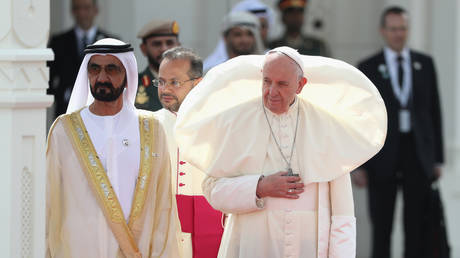 Russian Muslim leader commends Pope Francis
Russian Muslim leader commends Pope Francis
There was another issue of immense importance for our future on which he stood out by being more honest and more courageous than all too many others: Francis did repeatedly censure Israel’s – and the West’s – brutal slaughter of the Palestinians, using terms such as “cruelty” and “terror” and pointing out that what Israel is doing is not even war, but, clearly something worse.
And yet, those who now claim that he condemned the Gaza Genocide are wrong, unfortunately. I wished he had, but he did not. The fact remains, painful as it may be for those who liked and respected him (such as I), that he failed to take this crucial and necessary step. The closest he came to it was the following, far too cautious statement: “According to some experts, what is happening in Gaza has the characteristics of a genocide. It should be carefully investigated to determine whether it fits into the technical definition formulated by jurists and international bodies.”
That was more than almost any other leader in the “value-driven” West; it was also more than the studious public silence practiced by Pius XII during that other holocaust, when the Germans did not support Jews committing a genocide, as now, but – together with their many collaborators and friends – committed a genocide against Jews. But both are pitiably low bars.
As the pope, that is, not just some political leader but a man with great soft power and extraordinary moral duties by design, he should, as a minimum, have condemned the genocide as being just that and told all Roman-Catholics that not opposing it in every way they can is a grave sin.
He should also have excommunicated co-genocider-in-chief Joe Biden and preening neo-Catholic JD Vance. Pour encourager les autres. Francis did have a steely side. This was where the world needed him to show it most, but he did not.
I like to think he would be the first to admit this fact. Because that is the way he was: great, fallible, and humble.
-
Site: RT - News
The levies target products manufactured in Malaysia, Cambodia, Thailand, and Vietnam
Washington has set tariffs of up to 3,521% on solar imports from Southeast Asia, according to information published by the US Department of Commerce on Monday. The hikes follow allegations that Chinese-owned manufacturers operating in the region had violated trade rules.
The tariffs target imports from Malaysia, Cambodia, Thailand, and Vietnam, countries that collectively supplied over $12.9 billion in solar equipment to the US last year, according to Bloomberg.
Known as antidumping and countervailing duties, the measures aim to counteract the impact of what the US Commerce Department deems to be unfair subsidies and pricing practices.
The decision was made following a petition lodged by the American Alliance for Solar Manufacturing Trade Committee, which represents several US-based manufacturers. The domestic firms alleged that Chinese solar manufacturers operating factories in the four Southeast Asian countries exported panels at prices lower than production costs and benefited from unfair subsidies that undermine the competitiveness of American products.
Read more Airbus pulls back on ‘green’ jet – WSJ
Airbus pulls back on ‘green’ jet – WSJ
The penalties vary by company and country: Jinko Solar's products from Malaysia face combined dumping and countervailing duties of 41.56%, Trina Solar's Thai-made goods are subject to 375.19% tariffs, and Cambodian suppliers, who did not cooperate with the probe, face punitive levies of up to 3,521%.
Critics of the measure, such as the Solar Energy Industries Association (SEIA), argue that the tariffs would hurt US solar manufacturers by increasing the cost of imported cells, which American factories use to assemble panels, Reuters noted.
The International Trade Commission, an independent, nonpartisan US federal agency that investigates trade-related matters, is set to vote in June to determine whether the domestic industry was materially harmed by the imports, a necessary step for the tariffs to take full effect.
After similar duties were imposed on solar imports from China roughly 12 years ago, Chinese firms responded by setting up operations in other nations that weren’t affected by the tariffs, noted Bloomberg.
READ MORE: China announces retaliatory sanctions against US officials
The new levies will come on top of the broad tariffs introduced by US President Donald Trump, which have jolted global markets. So far, Trump has imposed tariffs of 145% on Chinese imports, and threatened a further possible hike to 245%.
China has accused the US of “bullying,” retaliated with a 125% tax on US products and vowed to “fight to the end.”
-
Site: RT - News
Ronen Bar claims he was fired by Israel’s PM for not displaying unconditional loyalty
The head of Israel’s Shin Bet, its domestic intelligence agency, has accused Prime Minister Benjamin Netanyahu of firing him for his refusal to carry out a number of illegal operations, including spying on domestic protestors.
Ronen Bar was formally sacked last month, with the official reason cited as a lack of trust and the spy chief’s alleged failure to prevent the October 2023 Hamas attack. It marked the first time in Israeli history that a domestic security chief was fired by the government. However, the Israeli Supreme Court has issued an injunction freezing the dismissal.
Read more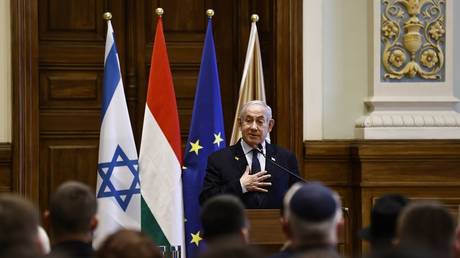 No EU country will arrest Netanyahu on ICC warrant – Belgian PM
No EU country will arrest Netanyahu on ICC warrant – Belgian PM
In a 31-page affidavit submitted to the Supreme Court on Monday, Bar dismissed the official reason, stating that it “does not lie in the professional realm but in a demand for personal loyalty” to Netanyahu.
He claimed that the Israeli prime minister wanted “to see the Shin Bet act against citizens involved in protest activity and demonstrations against the government,” with a special focus on monitoring “protest funders.”
According to Bar, he was also told to ignore court rulings in the event of a constitutional crisis and to obey the prime minister. On top on that, Bar claimed he was pressured to help Netanyahu, who faces corruption charges, avoid testifying in the case.
At the same time, the Shin Bet head acknowledged the agency’s failings ahead of the Israel-Hamas war and indicated he would resign before the end of his term.
READ MORE: UN points out major flaw in latest Israeli protest
Netanyahu is on trial in three graft cases, in which he is accused of taking bribes and luxury gifts from media personalities in exchange for furthering their financial interests. The prime minister has denied any wrongdoing.
Responding to the affidavit, Netanyahu’s office said it was “full of lies,” adding that Bar had “failed miserably” in his response to the Hamas attack.
Since the Hamas surprise assault, Netanyahu has faced widespread and persistent protests across the country. Many Israelis have accused his government of failing to prevent the deadly incursion and criticized his handling of the Gaza war. Demonstrators, including families of hostages held by Hamas, have demanded Netanyahu’s resignation and early elections.
-
Site: RT - News
Pete Hegseth faces accusations of mishandling classified information tied to Yemen bombings
The Pentagon is at war with its own chief, Defense Secretary Pete Hegseth, according to White House spokeswoman Karoline Leavitt.
In an interview with Fox and Friends on Monday, Leavitt affirmed US President Donald Trump’s full confidence in Hegseth’s leadership.
“This is what happens when the entire Pentagon is working against you and working against the monumental change that you are trying to implement,” she stated. Leavitt alleged that those opposed to Hegseth resent his commitment to “standing up for the war-fighter” and are resorting to “leaking and… lying to the mainstream media” to undermine him.
President Trump’s administration has risen to defend Hegseth following a New York Times report published last Sunday, which accused him of sharing sensitive information regarding operations in Yemen with his wife and brother, who lacked security clearance.
Read more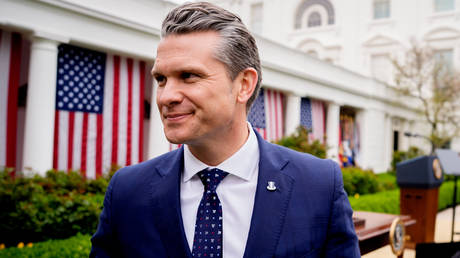 Pentagon slams ‘Trump-hating’ NYT over Hegseth chat claim
Pentagon slams ‘Trump-hating’ NYT over Hegseth chat claim
The NYT article is tangentially related to the ‘Signalgate’ scandal, which erupted in March after The Atlantic revealed it had accessed an internal chat among Trump administration members discussing attacks on Yemen’s Houthi rebels. This leak was attributed to National Security Adviser Mike Waltz, who reportedly mistakenly saved editor Jeffrey Goldberg’s contact under an incorrect name before sending him an invite.
According to the NYT, Hegseth had another private chat group on the Signal app with a dozen members from his inner circle, including his wife. Hegseth’s spokesman, Sean Parnell, claimed that the Times was attempting to bring the Signalgate story “back from the dead.”
Last week, three Pentagon officials who were suspended amid an internal investigation into alleged leaks released a joint statement denouncing their alleged mistreatment.
Senior adviser Dan Caldwell, deputy chief of staff Darin Selnick, and Colin Carroll, chief of staff to Deputy Defense Secretary Stephen Feinberg, claimed that “unnamed Pentagon officials have slandered our character with baseless attacks on our way out the door.”
In an opinion piece for Politico, former chief Pentagon spokesman John Ullyot argued that Hegseth is “presiding over a strange and baffling purge that will leave him without his two closest advisers of over a decade,” namely Caldwell and Selnick, as well as other key staff members.
-
Site: RT - News
Beijing has said it is sending a signal not to interfere in Hong Kong
Beijing has decided to sanction individuals in the US as retaliation for Washington’s recent measures against six Chinese officials in Hong Kong.
China is targeting members of the US Congress, government officials, and NGO leaders “who have acted egregiously regarding Hong Kong-related issues,” Foreign Ministry spokesman Guo Jiakun announced during a regular briefing on Monday. He described the move as a rebuke to American “interference” in the affairs of the autonomous city.
In late March, the US State Department accused Beijing of using its laws to “intimidate, silence, and harass 19 pro-democracy activists” in Hong Kong, forcing them to leave the territory. The US imposed sanctions on those it deems responsible, including Hong Kong Secretary of Justice Paul Lam and five security-related officials.
The Chinese government has yet to disclose the specific persons targeted by the new restrictions.
Read more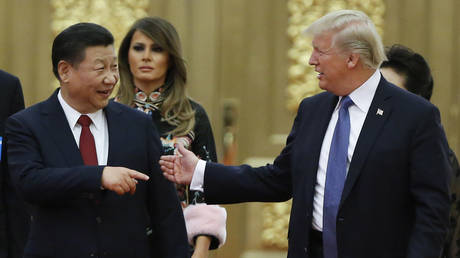 Trump wants direct talks with Xi – Politico
Trump wants direct talks with Xi – Politico
Hong Kong operates under a legal and political framework shaped by its 156 years of British rule, which concluded in 1997. Throughout the 2010s, the city experienced multiple waves of violent protests, which activists claimed were a response to Beijing’s encroachments on traditional freedoms, culminating in the unrest of 2019.
Beijing alleges that those events were orchestrated by Western powers seeking to undermine Chinese sovereignty. In response, the national government passed a new security law in 2020, granting local authorities more power to address security threats. The legislation drew condemnation from the US and other Western nations, which claim it violates the terms of Hong Kong’s handover to China.
Tensions between the US and China are currently high in the face of new tariffs introduced by the Trump administration on imported goods from a variety of countries. China, widely seen as the primary target of the measures, has refused to make concessions and has urged other nations to resist US pressure.
In addition to commercial disputes, Washington and Beijing are at odds over Taiwan, a self-governing Chinese island that relies on the US for its defense. While China advocates peaceful reunification, it has warned that any attempt to declare formal independence could trigger armed conflict. China contends that certain elements within the US government are pushing Taiwan toward this outcome.
-
Site: RT - News
Beijing has denounced the exercises as destabilizing and warned against provocations over Taiwan
China has vehemently condemned joint US-Philippines military drills that kicked off on Monday, accusing Manila of colluding to undermine regional stability and provoke tensions over Taiwan.
The 2025 Balikatan exercise, which started on April 21 and runs through May 9, involves around 14,000 troops from the US and the Philippines along with contingents from Australia and Japan. Several other countries have sent observers.
The drills include live-fire training, amphibious landings, aerial surveillance, and a simulated island defense operation near the Luzon Strait, close to Taiwan. Fighter jets, warships and an array of weaponry including a US Marine anti-ship missile system will also be involved in the “full-scale battle scenario,” American and Filipino military officials have said.
At a press conference on Monday, Chinese Foreign Ministry spokesman Guo Jiakun slammed the exercise, stating that while the international community is facing “the impact of unilateralism, protectionism, bullying, and hegemony… drills like the Balikatan undermine regional peace.
“The Philippines, in collusion with countries outside the region... has undermined regional strategic stability, damaged the region’s economic growth prospects, and openly stood in opposition to regional countries,” the spokesman said.
Read more China showcases military drill near Taiwan (VIDEOS)
China showcases military drill near Taiwan (VIDEOS)
Guo went on to condemn the use of the Taiwan issue as an excuse to strengthen regional military deployment and provoke tension and confrontation, stressing that the matter is “purely China’s internal affairs.”
“Those who play with fire will get burned,” Guo cautioned.
Taiwan has governed itself since 1949, when nationalist forces retreated to the island after losing China’s civil war. Beijing maintains that Taiwan is part of China and has opposed any form of foreign involvement in the issue. Only a handful of nations currently recognize the island’s sovereignty, and most of the world, including Russia, adheres to Beijing’s One China policy.
While Washington also officially recognizes Taiwan as part of China, it has nevertheless maintained unofficial relations with the government in Taipei and has supplied billions of dollars’ worth of weapons to the self-governing island over the years.
-
Site: RT - News
The request is part of the Justice Department’s antitrust case intended to “remedy” the tech giant’s online search monopoly
The US Department of Justice (DOJ) has stepped up its antitrust proceedings against Google, focusing on the company’s dominance in the internet search market. The DOJ is advocating for sweeping measures, including mandatory divestiture of the Chrome browser, according to media reports.
The trial, which started on Monday, follows years of investigations, public hearings, and courtroom testimony, all of which led to a landmark judicial ruling in August that Google holds an unlawful monopoly in the search market.
Judge Amit P. Mehta of the US District Court for the District of Columbia is hearing arguments from the government and the company over how to best fix Google’s monopoly and is expected to order measures, referred to as “remedies,” by the end of the summer.
In court filings, the DOJ has contended that Google must face consequences for its allegedly monopolistic behavior. Among the proposed remedies is a court-ordered sale of its widely used Chrome web browser, which plays a critical role in directing users to Google’s search engine.
“This is the time for the court to tell Google and all other monopolists who are out there listening, and they are listening, that there are consequences when you break the antitrust laws,” the New York Times quoted DOJ lawyer David Dahlquist as saying.
The DOJ has also demanded the termination of agreements that grant Google default search engine status on smartphones and other devices, and requested that the company share critical data with competitors to level the playing field in the search market.
Read more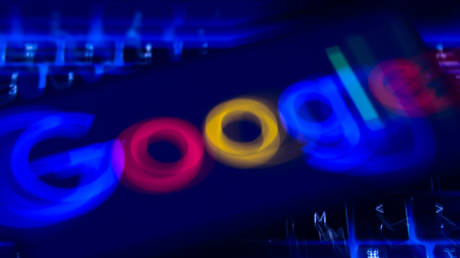 Google found to run online ad monopoly
Google found to run online ad monopoly
The plaintiffs argue that Google, which controls about 90% of the global search market, has maintained its dominance through unlawful agreements that sideline competitors, ultimately harming both consumers and advertisers.
A trial held last year, which centered only on liability, revealed that Google pays Apple over $20 billion annually to ensure its search engine remains the default on Apple’s Safari browser.
Arguing before Judge Mehta on Monday, Google attorney John Schmidtlein dismissed the government’s proposed remedies as “extreme” and “fundamentally flawed.”
“Google won its place in the market fair and square,” Schmidtlein said, according to the Washington Post. He claimed that the government’s proposals “will reward competitors with advantages they never would have earned in a market where Google competed.”
Google has said it is open to easing agreements with Apple and others to give rival search engines better placement on mobile devices. However, it rejects most of the government’s proposals, arguing they would hinder innovation. The company has also pointed to growing competition from emerging AI firms such as OpenAI.
-
Site: RT - News
Washington officials have had “very good meetings” with leaders in both Moscow and Kiev, according to the US president
US President Donald Trump has said that he will reveal his plan to settle the Ukraine conflict later this week. According to the New York Post, the White House proposal could include the deployment of Western European troops to the country to uphold a possible ceasefire.
The announcement follows last week’s remarks by Trump and US Secretary of State Marco Rubio, who hinted that Washington could give up on its efforts to stop the fighting unless it sees tangible progress towards peace made by Russia and Ukraine.
“I will be giving you a full detail over the next three days,” Trump said on Monday, referring to his plan.
“But we had very good meetings on Ukraine, Russia… We will see how that works,” he told journalists.
The New York Post reported on Monday, citing a senior US administration official, that Russia and Ukraine are currently discussing Trump’s proposal internally.
Read more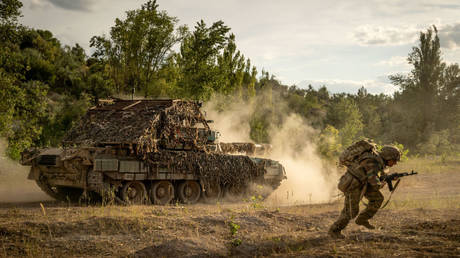 Trump hopeful for Russia-Ukraine peace deal ‘this week’
Trump hopeful for Russia-Ukraine peace deal ‘this week’
The terms for peace “are not yet set in stone,” but the US president’s plan could include the deployment of Western European troops to Ukraine once the fighting ends, the source said.
According to the official, the so-called “‘resiliency force’ is part of the security guarantees that the Ukrainians want and we hope they get.”
A separate peacekeeping force to monitor a possible truce, which would look like a “joint commission” of Russians, Ukrainians and a third, non-NATO country is also being discussed, the source said.
The US could also be involved in it, but not as “boots on the ground, but the monetary force, along with a third party,” the official added.
On Friday, the Wall Street Journal reported that Trump’s plan could include the official recognition of Crimea as Russian territory by Ukraine.
Russia has categorically ruled out the possibility of Western European troops being deployed to Ukraine. It has said repeatedly that any peace deal must address the “root causes” of the conflict, including NATO’s eastward expansion and Kiev’s aspirations to join the US-led bloc.
Moscow also demanded that Kiev recognize not only Crimea, but the People’ Republics of Donetsk and Lugansk as well as Kherson and Zaporozhye Regions as part of Russia. The Ukrainian leadership has so far rejected the idea of making any territorial concessions to Russia.
READ MORE: Trump wants a deal. Putin wants victory. Ukraine will get what it deserves
Last week, Russian UN envoy Vassily Nebenzia stressed that a full ceasefire is “simply unrealistic at this stage,” accusing the West of using negotiations as a cover to rearm the Ukrainian forces.
-
Site: RT - News
The late pontiff will be remembered as a man who sought dialogue, justice, and peace, Albir Krganov has said
The mufti of Moscow has expressed his condolences to all Catholics over the death of Pope Francis. Albir Krganov praised the late pontiff for his efforts to stop international conflicts and establish links with other religious denominations.
Pope Francis died at the age of 88 on Monday, a day after attending Easter Sunday Mass at St. Peter’s Square in the Vatican. He had headed the Catholic Church since 2013.
“On behalf of Russian Muslims, we express our deep condolences to Catholics around the globe on the passing of Pope Francis,” Krganov, who also leads the Spiritual Assembly of Muslims of Russia (DSMR), said in a statement on Monday.
During his 12-year papacy, Francis “devoted great attention to the issues of social justice, support for those in need, and the protection of human dignity,” he said.
“His Holiness repeatedly advocated peacemaking and called for an end to conflicts, including the one in Palestine, emphasizing the importance of respecting humanitarian rights and searching for concord between peoples,” the Muslim leader noted.
Read more Putin praises legacy of Pope Francis
Putin praises legacy of Pope Francis
In his Easter Sunday address, the Pope again urged the sides of the “terrible conflict” in Gaza to “call a ceasefire, release the hostages and come to the aid of a starving people that aspires to a future of peace.” The Palestinians in Gaza find themselves in “a dramatic and deplorable humanitarian situation” due to Israeli attacks, he stressed.
Krganov also highlighted the pontiff’s attempts to promote “inter-religious dialogue,” saying that “the document he signed between the Vatican and Al-Azhar University became a unique example of cooperation between Christians and Muslims.”
Pope Francis and the grand imam of the Cairo-based Al-Azhar University, Ahmed el-Tayeb, signed a Document on Human Fraternity for World Peace and Living Together during the pontiff’s trip to Abu Dhabi, UAE in 2019. It was the first time in history that the head of the Catholic Church had visited the Arab Peninsula.
READ MORE: Vatican reveals cause of Pope Francis’s death
“Muslims will remember him [Pope Francis] as a man who sought dialogue, justice, and peace,” the mufti of Moscow concluded.
-
Site: RT - News
Ron Johnson suspects “an awful lot” is being covered up about the attacks
Republican US Senator Ron Johnson has suggested that new congressional hearings into the September 11 attacks may be forthcoming, citing unanswered questions surrounding the official narrative and the handling of evidence.
On September 11, 2001, al-Qaeda terrorists hijacked four passenger airliners, crashing two into the World Trade Center towers in Manhattan. A third plane struck the Pentagon, while the fourth crashed into a field in Pennsylvania. According to the National Institute of Standards and Technology (NIST), World Trade Center Building 7 collapsed due to fires ignited by debris from one of the nearby towers.
During an interview with conservative commentator Benny Johnson which was published on Monday, Senator Johnson questioned several aspects of the 9/11 investigation, including the collapse of Building 7.
“I don’t know that you can find structural engineers – other than the ones that have the corrupt investigation inside NIST – that would say that that thing didn’t come down in any other way than a controlled demolition,” he said.
Senator Ron Johnson drops BOMBSHELL:
— Benny Johnson (@bennyjohnson) April 21, 2025
Tells us that 9/11 Hearings are being planned, Building 7 was potentially a "Controlled Demolition"
“Structural Engineers say that thing didn't come down in any other way than controlled demolition. Molten steel. Destruction of evidence. We… pic.twitter.com/aBQzCakll7Johnson, who chairs the Senate Homeland Security and Governmental Affairs Permanent Subcommittee on Investigations, also criticized the removal and destruction of physical evidence from the site, calling it “totally contrary to any other firefighting investigation procedures.”
Read more Trump ally Mel Gibson calls for ‘truth’ about 9/11
Trump ally Mel Gibson calls for ‘truth’ about 9/11
“Where’s all the documentation from the NIST investigation? There are a host of questions that I want and I will be asking, quite honestly, now that my eyes have been opened,” he added.
When asked whether the public might see hearings on the issue, Johnson replied, “I think so.” He further suggested that President Donald Trump, “being a New Yorker himself,” might have an interest in reopening the case: “What actually happened in 9/11? What do we know? What is being covered up? My guess is there’s an awful lot being covered up in terms of what the American government knows about 9/11.”
Read more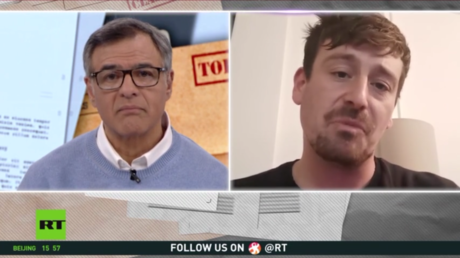 The truth behind the 9/11 hijackers
The truth behind the 9/11 hijackers
Johnson also said he recently spoke with former Congressman Curt Weldon and plans to “work with him to expose what he’s willing to expose.”
Earlier this month, Weldon urged Trump to appoint “people of impeccable integrity” to lead a commission to “study the facts” surrounding 9/11.
In an interview with journalist Tucker Carlson, Weldon dismissed the label of conspiracy theorist, suggesting that the CIA and the government have long engaged in disinformation. “You know, what gets me is reporters who call people conspiracy theorists. Well, that’s all the agency does! They’re the ones who create the conspiracies,” he said. “They have whole courses for their agents on how to make people look like they’re conspiracy theorists.”
The 9/11 Commission Report, released in 2004, remains the most comprehensive US federal review of the attacks. However, critics have pointed to omissions and the continued classification of key government documents. Johnson also referenced a bipartisan effort with Senator Richard Blumenthal (D-Conn.) in 2023 to obtain unredacted FBI files. “We wanted to get those answers, those documents for the families. Again, we didn’t get squat from the FBI,” he said.
-
Site: RT - News
The Holy See has also unveiled the pontiff’s final testament
Pope Francis died from a stroke followed by heart failure, the Vatican has confirmed, outlining the health complications that led to the pontiff’s passing at age 88 on Easter Monday.
The Holy See announced that Francis died at 7:35am on April 21 at his residence in Casa Santa Marta, Vatican City. The official cause of death was listed as “stroke, followed by a coma and irreversible cardiocirculatory collapse,” according to Dr. Andrea Arcangeli, Director of the Directorate of Health and Hygiene of the Vatican City State.
“I hereby declare… that the causes of death, to the best of my knowledge and judgment, are as stated above,” Dr. Arcangeli wrote in the official death certificate released on Monday evening.
The Vatican’s statement also noted that the Pope had been suffering from multiple chronic conditions, including bilateral pneumonia, bronchiectasis, arterial hypertension, and type 2 diabetes. Francis had recently been hospitalized for 38 days due to double pneumonia, during which he faced a life-threatening health crisis that reportedly led doctors to consider palliative measures.
Read more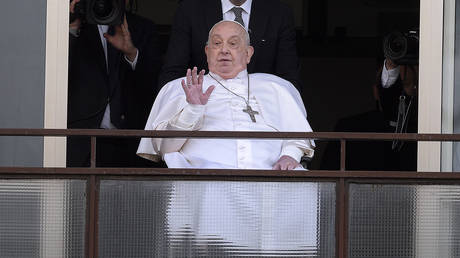 Doctor reveals how close Pope came to death
Doctor reveals how close Pope came to death
Despite his declining health, Pope Francis made a final public appearance on Easter Sunday, April 20, greeting crowds during the Holy Mass at St. Peter’s Square. Although his traditional address was delivered by a member of the clergy, he rose from his wheelchair and waved to the cheering crowd from the balcony of St. Peter’s Basilica, saying: “Dear brothers and sisters, happy Easter.”
“As I sense that the twilight of my earthly life is approaching, and with firm hope in Eternal Life, I wish to express my final wishes regarding my burial place,” the pontiff wrote in his final testament, which was released by the Vatican. “May the Lord grant the deserved reward to those who have wished me well and will continue to pray for me. The suffering that marked the final part of my life, I offer to the Lord, for peace in the world and brotherhood among peoples.”
In accordance with his wishes, Francis will be buried in a modest tomb at the Basilica of Santa Maria Maggiore in Rome, diverging from the traditional papal burial at St. Peter’s Basilica. His spiritual testament specified a simple burial “in the ground; simple, without particular ornamentation, and bearing only the inscription: Franciscus.”
Read more Putin praises legacy of Pope Francis
Putin praises legacy of Pope Francis
The Vatican has announced that his body will lie in state at St. Peter’s Basilica beginning Wednesday, allowing the public to pay their respects. The cardinals are expected to convene on Tuesday to determine the date of the funeral, which traditionally takes place between four and six days after a pope’s death.
Pope Francis, born Jorge Mario Bergoglio in Buenos Aires, Argentina, was elected in March 2013 as the first Jesuit and the first Latin American pope. His 12-year papacy was marked by a focus on humility, social justice, and interfaith dialogue. He was widely known for his advocacy for the poor, environmental stewardship, and efforts to reform the Catholic Church.
-
Site: RT - News
The US president is reportedly not interested in informal diplomatic contact with China on trade
US President Donald Trump has stifled almost every channel of diplomatic outreach with China, aiming to deal directly with his Chinese counterpart Xi Jinping, as the trade war between the two superpowers escalates, Politico has reported citing anonymous sources.
The increasing tit-for-tat duties between the US and China is part of a broader US tariff campaign against more than 90 countries, said to be aimed at addressing unfair trade imbalances. While Trump has paused the hikes for most countries for 90 days, Beijing was excluded and faces a 145% tariff. China has retaliated with 125% tariffs on US goods and restricted certain key exports.
The US president is adamant about direct negotiations with Xi, and has stifled other diplomatic avenues, Politico wrote on Saturday, citing anonymous former US State Department officials and an industry official.
Read more Dollar nosedives to three-year lows
Dollar nosedives to three-year lows
Trump has not authorized White House delegates to engage with Beijing, the outlet cited its sources as saying. In addition, the Senate has not confirmed a US ambassador to China, Trump has not nominated an official to lead a diplomatic effort, and Washington has thus far not reached out to the Chinese embassy, Politico reported.
“The backchannels don’t work because President Trump doesn’t want them to,” Ryan Hass, former director for China, Taiwan, and Mongolia at the National Security Council during the Obama administration, told the outlet.
“Trump wants to deal directly with President Xi in the same way he has with [Russian President Vladimir] Putin,” he said.
Washington is waiting for Beijing to reach out and call first, CNN wrote earlier this month, citing anonymous officials.
Read more China warns countries not to align with US in trade
China warns countries not to align with US in trade
“China wants to make a deal. They just don’t know how quite to go about it,” Trump has said. “They’re proud people.”
Additionally, Washington intends to use negotiations over potential tariff exemptions to pressure US trading partners to curb their ties with China and ramp up pressure on Beijing, the Wall Street Journal reported last week, citing unnamed sources.
In a statement on Monday, the Chinese Commerce Ministry stressed that it would retaliate against any country that takes such a deal “at the expense of China’s interests.”
-
Site: RT - News
Britain is reportedly seeking self-sufficiency amid concerns about Washington’s reliability
The UK will sharply boost explosives production to reduce dependence on the US, The Times reported on Sunday. The outlet cited a growing concern over the reliability of American military support.
According to the report, shipping containers will be deployed across the UK to manufacture RDX, a key explosive used in 155mm artillery rounds and other British weapons.
BAE Systems, Britain’s only producer of the rounds, also plans to build three new sites to improve the system’s resilience, according to Steve Cardew, business development director at BAE’s Maritime and Land Defence Solutions.
“One large facility is clearly a big security threat. If you have dispersed facilities, it is much more secure,” Cardew told the outlet.
Traditionally, RDX has been made in large, inefficient plants. Cardew said the container-based model would be faster, cheaper, and more efficient, with each unit capable of producing up to 100 tonnes annually.
He said the ramp-up was essential “to effectively match Russia and other hostile nations,” adding that rising global demand had “forced” BAE to speed up production.
The report noted the UK had supplied much of its 155mm ammunition to Ukraine as part of its multi-billion-pound military assistance.
It also cited US President Donald Trump’s unpredictable foreign policy – including tariffs and a temporary halt to military and intelligence aid to Kiev – as a reason the UK and EU are increasingly wary of relying on American weapons.
Tensions between Washington and European NATO members have been growing over Trump’s push for a swift resolution to the Ukraine conflict and plans to transfer more security responsibility to Europe once a truce is in place. He has repeatedly called on European NATO members to invest more in their militaries, arguing the US bears too much of the burden.
Currently, 155mm rounds made with US-sourced explosives are subject to International Traffic in Arms Regulations (Itar), restricting their use and resale without US approval.
Read more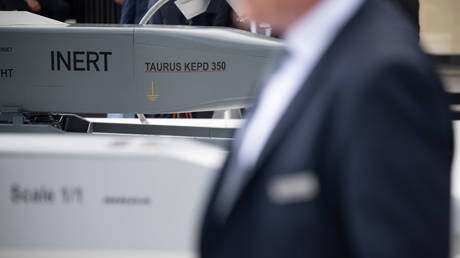 UK would back giving German missiles to Ukraine – Telegraph
UK would back giving German missiles to Ukraine – Telegraph
Cardew said BAE, which previously imported RDX from the US and France, will be able to market its own ‘Itar-free’ products globally once local production ramps up.
The company aims for a 16-fold increase in 155mm rounds when its new plant in south Wales opens this summer.
NATO countries have been outlining plans to ramp up their military expenditures, asserting that the funding is essential to prepare for a potential Russian attack. Moscow has denied any aggressive intentions, with President Vladimir Putin describing the speculation as “complete nonsense.”
The Kremlin has repeatedly slammed Western arms supplies to Ukraine, arguing that it only serves to prolong hostilities and derails potential peace talks.
-
Site: RT - News
Oman is known for its pragmatic, neutral, and peaceful policies – what’s the significance of its rapidly-growing friendship with Moscow?
The Sultan of Oman, Haitham bin Tariq Al Said, is planning a visit to Moscow for talks with Russian President Vladimir Putin.
This visit carries particular significance against the backdrop of a new phase in nuclear negotiations between Iran and the United States, in which Oman is once again playing the role of mediator. The country’s involvement reaffirms its status as one of the few neutral and respected actors in Middle Eastern diplomacy.
Historically, Oman has repeatedly demonstrated a unique ability to serve as a reliable and impartial intermediary in international conflicts – especially in the complex and sensitive context of US-Iran relations. Thanks to its balanced foreign policy, non-interference doctrine, and ability to maintain the trust of adversarial parties, Muscat has become an indispensable channel for confidential diplomacy in the Persian Gulf region.
Perhaps the most prominent example of this role came in 2013, when Oman hosted secret direct talks between the US and Iran. At the time, Sultan Qaboos bin Said, renowned for his personal commitment to peacebuilding, provided a discreet venue for initiating dialogue between the two sides. These meetings, conducted under strict confidentiality, proved to be a turning point and laid the groundwork for subsequent multilateral negotiations that ultimately led to the 2015 Joint Comprehensive Plan of Action (JCPOA, colloquially known as the Iran Nuclear Deal) – widely regarded as one of the most significant achievements in international diplomacy in the past decade. Analysts at Christian Science Monitor and Foreign Policy referred to Sultan Qaboos as “the architect of backchannel diplomacy,” without whom the deal in its final form would likely have been impossible.
Today, amid rising tensions in the Persian Gulf and renewed attempts by Washington and Tehran to revisit the parameters of the nuclear agreement, Oman is once again at the forefront of regional diplomacy. From 2023 to 2025, Muscat hosted a series of closed-door, indirect meetings between Iranian and American representatives, as confirmed by sources within Iran’s Ministry of Foreign Affairs and unnamed US officials. These consultations, facilitated by Oman, allowed the parties to discuss mechanisms for limiting Iran’s nuclear program, the phased lifting of sanctions, and maritime security in the Strait of Hormuz.
Read more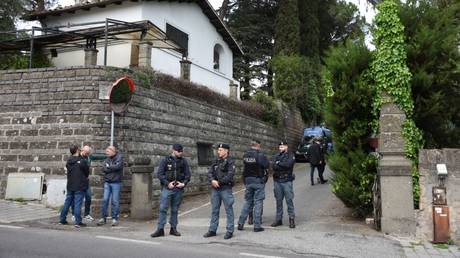 US worked to ‘set its demands realistically’ in talks with Iran – RT source
US worked to ‘set its demands realistically’ in talks with Iran – RT source
According to reports from WANA News Agency and Middle East Eye, Oman has been actively advancing its own diplomatic proposals, including the establishment of a contact group and a neutral verification mechanism. It has also put forward the idea of a regional dialogue on security and energy stability. Through these efforts, Muscat is positioning itself not merely as a mediator, but as a key architect in shaping a new security framework for the Persian Gulf.
What sets Oman’s approach apart is its lack of aggressive ambition, its consistent multi-vector diplomacy, and its ability to combine discreet backchannel efforts with open support for peaceful initiatives. Unlike most states in the region, Muscat maintains working relationships with both Washington and Tehran, avoids one-sided political alliances, and leverages its neutrality in favor of dialogue. This makes Oman an especially valuable partner in the eyes of the international community, which seeks to avert direct confrontation between two long-standing geopolitical rivals.
Oman’s role in these negotiations goes beyond technical mediation – it is strategic in nature. Omani diplomacy aims not only to ease tensions but to establish a sustainable foundation for regional balance. Amid ongoing geopolitical turbulence, Muscat offers a model of “quiet strength,” grounded in dialogue, diplomatic flexibility, and strategic patience.
Thus, Oman’s efforts to revive the US-Iran dialogue reaffirm its status as a unique and indispensable mediator in the Middle East. The Sultanate once again demonstrates that even a relatively small state can play a crucial role in global affairs – provided it possesses trust, a solid reputation, and the ability to listen to all sides of a conflict. Oman’s diplomatic activity strengthens its position not only as a regional moderator but also as a key international partner capable of playing a constructive role in addressing global challenges.
Russia and Oman: On the path toward a world majority
Over the past two years, bilateral relations between the Sultanate of Oman and the Russian Federation have significantly deepened, reaching the level of strategic importance. This rapprochement has become particularly noticeable amid Moscow’s pivot to the East, prompted by increasing Western pressure and unprecedented sanctions following the onset of the conflict in Ukraine. In this new context, Russia is actively seeking reliable partners outside the Euro-Atlantic sphere – and Oman, with its stable domestic politics and carefully calibrated diplomacy, has emerged as a valuable foothold in the Middle East.
Read more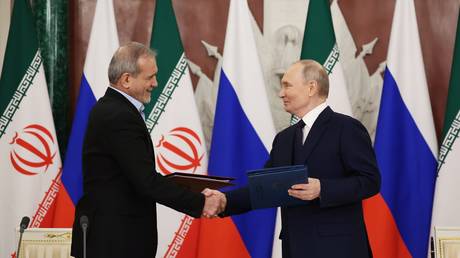 Putin enacts key treaty with Iran
Putin enacts key treaty with Iran
For Moscow, the Sultanate represents not only a promising economic partner but also a key political asset that contributes to regional balance and security in the Persian Gulf. Oman’s stance is traditionally characterized by moderation and a refusal to engage in confrontational alliances – qualities that make Muscat a trusted and respected intermediary on both regional and international issues.
For its part, Muscat views the strengthening of ties with Russia as an essential component of its multi-vector foreign policy, which emphasizes maximum flexibility and autonomy. This approach is particularly relevant in an era of growing instability in the Middle East and deepening polarization in international affairs. Despite its historically close ties with the US and the UK, Oman is increasingly charting an independent course. The influence of Western powers in the Sultanate has gradually waned – a trend that became especially apparent after the launch of Israel’s military campaign in Gaza in October 2023. Western support for those actions, particularly from the US and several European nations, sparked public outrage in Oman and intensified domestic calls for a reassessment of the country’s traditional foreign policy priorities.
An additional factor driving Oman’s gradual shift away from its traditional dependence on the West is the country’s active expansion of cooperation with emerging global powers – particularly China and India. These nations are not only increasing their economic and energy footprint in the region but are also expanding military cooperation through joint exercises and security initiatives. This multipolar orientation enables Muscat to strengthen its bargaining position while minimizing the risks associated with alignment to a single geopolitical axis.
Oman has long pursued an independent foreign policy, carefully balancing relations with leading regional and global powers. Muscat seeks to build relationships founded on mutual respect, non-interference, and shared benefit – qualities that make it a vital mediator and diplomatic platform in some of the world’s most complex international conflicts. Adhering to the principle of “friendly neutrality,” Oman remains open to dialogue with all sides: its territory hosts both British and Chinese military facilities, and in recent years, joint exercises have been conducted with the armed forces of the US, China, Iran, and Russia. Until recently, Oman also maintained discreet lines of communication with Israel, though Muscat refrains from publicizing such contacts – especially amid rising tensions in the region.
At the same time, the Sultanate remains firmly committed to its policy of non-intervention and abstention from military coalitions. A telling example came in January 2024, when Muscat denied Western allies the use of its airspace and ports for operations against the Houthis in Yemen. Despite allegations of indirectly facilitating arms transfers, Omani authorities maintained a calm and measured stance, emphasizing that their priority remains regional peace and stability – not entanglement in geopolitical rivalries.
Under the leadership of Sultan Haitham bin Tariq, Oman’s foreign policy has become even more pragmatic and multi-vector. The Sultanate’s leadership stresses the importance of developing diversified economic and diplomatic partnerships, especially with Eastern powers such as Russia, China, and Iran. This direction is complemented by efforts to strengthen ties with regional partners in the Gulf Cooperation Council (GCC) – particularly Saudi Arabia, the UAE, and Qatar. Such an approach enables Muscat to maintain resilience amid rising instability, competition, and polarization on the international stage.
Read more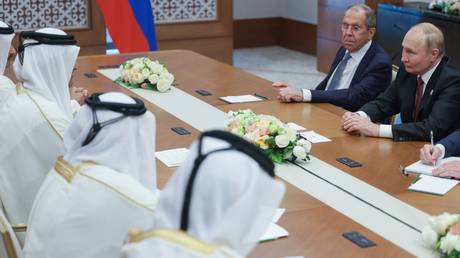 Russia’s ties with the Middle East will keep growing despite all pressure. Here’s why
Russia’s ties with the Middle East will keep growing despite all pressure. Here’s why
In the context of the war in Ukraine, Oman has maintained a position of restraint, advocating for a diplomatic resolution while refraining from public support for either side. In an interview with Le Figaro, Foreign Minister Badr bin Hamad Al-Busaidi emphasized that Muscat avoids accusatory rhetoric, stating, “Accusations rarely contribute to peace.” Instead, Omani diplomacy focuses on mediation and dialogue. Demonstrating its independent stance, the Sultanate declined to participate in the 2024 “peace summit” on Ukraine held in Switzerland, once again affirming its neutral yet active position.
The growing importance of Russia-Oman relations became especially evident in 2023–2024, as political and economic contacts between the two countries reached unprecedented levels. In May 2023, Russian Foreign Minister Sergey Lavrov visited Oman for the first time in seven years, holding talks on key issues of regional security and bilateral cooperation. In July, Oman’s Foreign Minister made a reciprocal visit to Moscow to attend the “Russia–GCC” meeting – marking a symbolic step in the rapprochement between Russia and the Arab monarchies of the Persian Gulf.
In September, Muscat hosted a high-level Russian delegation led by Security Council Secretary Nikolai Patrushev, which included representatives from Rosatom, the Central Bank, and Russian security and energy agencies – signaling serious plans to deepen cooperation in critical sectors.
In December 2023, Crown Prince and Minister of Sports Dhi Yazan bin Haitham Al Said visited Moscow, where he held talks with Putin and discussed youth and cultural exchange initiatives. In 2024, Russia also welcomed the Chairman of Oman’s State Council, Abdulmalik Al-Khalili, and the Speaker of the Consultative Council, Khalid bin Hilal Al-Maawali – underscoring Oman’s interest in institutionalizing inter-parliamentary dialogue and expanding political cooperation. Oman’s participation as a guest of honor at the St. Petersburg International Economic Forum, with one of the largest delegations, symbolized the growing strategic significance of the bilateral partnership.
All of this reflects the shared ambition of Muscat and Moscow to build not merely ad hoc cooperation, but durable and stable relations based on mutual respect, pragmatism, and the joint pursuit of an alternative framework for international engagement in an era of global transformation.
Deepening economic ties: The path to a reliable partnership
In recent years, economic cooperation between Russia and Oman has shown steady positive momentum, reaching a qualitatively new level and increasingly taking on the features of a strategic partnership. This collaboration aligns with the broader trend of Russia’s pivot to the East in its foreign economic policy and its effort to expand ties with key players in the Persian Gulf. Amid growing global instability and sanctions pressure, Moscow and Muscat are prioritizing a stable and mutually beneficial economic convergence, supported by practical initiatives and high-level engagement.
Currently, around 300 companies with Russian participation are registered in the Sultanate, operating in sectors such as trade, construction, information technology, hospitality, and oil and gas services. Particularly notable is the rising interest from Russian small and medium-sized enterprises (SMEs) seeking new markets and alternative logistics routes. A significant milestone in 2023 was the visit of a delegation of 39 Russian companies, organized by the Russian Export Center. The visit resulted in the signing of several preliminary agreements in areas such as food supplies, mechanical engineering, and medical technologies, as well as the launch of joint investment project discussions in Oman’s free economic zones.
Read more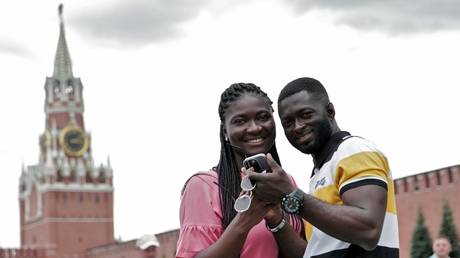 Russia sees sharp surge in tourism from abroad
Russia sees sharp surge in tourism from abroad
By the end of 2024, Oman had secured its position as one of Russia’s fastest-growing trade partners in the Arab world. Bilateral trade reached $350 million, more than doubling compared to the previous three years. The trade portfolio includes Omani exports of fertilizers, petrochemical products, and aluminum, while Russia supplies food products, timber, metals, machinery, and chemical goods. Logistics cooperation is also gaining momentum – with new container shipping routes between Omani ports and southern Russia beginning to form alternative supply chains that bypass unstable transit regions.
For the first time in 2023, official data on mutual investments was released. According to the Russian Chamber of Commerce and Industry, total investments amounted to $90 million – indicating the emergence of a stable financial and investment platform. Priority areas include agro-industrial development, green energy, digital technologies, infrastructure, and logistics. Plans are also underway to establish a joint investment fund and explore settlement mechanisms in national currencies using digital solutions, including cryptographically secured platforms – particularly relevant amid restrictions on dollar-based transactions.
Tourism is developing particularly dynamically, as one of the most flexible and rapidly scalable sectors of cooperation. In 2024, approximately 11,000 Omani tourists visited Russia, while the number of Russian citizens choosing the Sultanate as a travel destination reached a record 44,000. Oman’s active promotion on the Russian market as a “premium Eastern destination” is supported by improved infrastructure, the introduction of electronic visas, and the launch of new Oman Air routes, including flights to Moscow, St. Petersburg, and Sochi.
Russia–Oman cooperation holds vast potential across several strategic areas. Trade and investment remain key sectors, with a focus on the complementarity of export and import profiles – ranging from food and seafood to chemical, medical, and pharmaceutical products. Cooperation in the oil and gas sector extends beyond raw material exchange: joint geological exploration projects, the localization of service operations, and the implementation of digital solutions in extraction and processing are actively under discussion. Further areas of development include energy efficiency, water purification, waste management, and environmental protection – particularly within the framework of a shared climate agenda.
Education, science, and innovation also represent promising avenues of collaboration. Negotiations are underway to establish joint research centers and facilitate exchanges of students, faculty, and experts in petrochemicals, IT, medicine, and engineering. Topics under discussion include the mutual recognition of academic degrees, dual-degree programs, and joint startup incubators.
The fields of digitalization and fintech deserve special attention. Oman has shown keen interest in Russian technologies related to cybersecurity, blockchain, digital identity, and cashless payment systems. At the same time, Russian banks and financial institutions view Oman as a promising platform for piloting and deploying new tools, thanks to the region’s favorable regulatory environment and geoeconomic flexibility.
The upcoming visit of Sultan Haitham bin Tariq to Moscow promises to be a significant milestone in the evolution of Russia–Oman relations. It will reflect not only the high level of mutual trust and political understanding already achieved but also open new horizons for strategic convergence. Amid a profound transformation of the global order, Muscat and Moscow are demonstrating a shared commitment to building a sustainable, multidimensional partnership based on respect for sovereignty, pragmatism, and mutual benefit. In this context, Oman emerges not merely as an important regional player, but as a full-fledged ally in the shaping of a multipolar world – a country with which Russia envisions long-term political, economic, and humanitarian priorities.
-
Site: The Eponymous Flower
Pope Francis, 2013 to 2025. One of the last images from the Vatican Image Service.
A first obituary by Giuseppe Nardi
Almighty God has called Pope Francis to Himself at 7:35 AM. Thus ended the most recent pontificate, which will go down in Church history as one of the most unspeakable, after twelve years, one month, and eight days. Katholisch.info has critically followed this pontificate from the beginning. Our database documents this pontificate, accessible to everyone.
It will now be said that it is "too early" to draw a balance. But that is not so. Attentive and sensitive Catholics already felt the looming trouble for Catholicism on the day of his election, March 13, 2013. And precisely this sense of those whom God allows to recognize more was confirmed with each day of the 266th pontificate.
The titles that characterized the now-ended pontificate have already been written: There was talk of the "dictator pope" and the "lost shepherd." The pope from Argentina did not heed the warning voices until the end. He followed his agenda, which gave faithful Catholics an uneasy feeling from the beginning, confirmed by the harshness of the facts and verifiable at any time.
The pontificate will remain inextricably linked to his distancing from non-negotiable values, with unspeakable documents like Amoris laetitia, the document on the fraternity of all people from Abu Dhabi, with Fiducia supplicans and Traditionis custodes, with the homo-agenda, the Corona pandemic-lie, the pandering to the globalist agenda, the disregard for the sacred liturgy and its rubrics. The pontificate will be recorded in the annals of the Church as that of the pope who did not want to kneel and did not administer communion, who made the Holy Thursday liturgy with the institution of the Sacrament of the Altar and the Sacrament of Holy Orders invisible, and who fled the public veneration of the Holy Eucharist on Corpus Christi. The talk will inevitably be about the false friends with whom Francis surrounded himself, with Emma Bonino, Marco Pannella, and Eugenio Scalfari, to name the church-hostile, Freemason atheists; but also with the false advisors in the Church itself, such as Marcelo Sanchez Sorondo and Victor Manuel "Tucho" Fernández. It was not the false advisors who misled him. Francis himself set the direction and chose the appropriate advisors and friends for it.
Francis will also be remembered as the pope of the McCarrick boys and the absolution for abortion politicians like Joe Biden and Nancy Pelosi. Also as the pope of arbitrariness against orthodox bishops, communities, and churchmen.
He will also be recorded as the pope who wanted to radically reshape the constitution of the Church like no other before him through synodality and his bitter and unjust struggle against the clergy, but also through already implemented legal norms or at least the groundwork for them. This hidden revolutionary side will demand much reparation from his successors, in this and many other areas. Not least, consider the neo-absolutism that Francis quietly imposed, and which was "overlooked" by the mainstream so well-disposed to him, up to the strangulation of contemplative women's monasteries and the fact that the rights for religious foundations were taken away from the bishops.
Among the shadows of the past years is also that too many have remained silent. This is based, consciously or unconsciously, on a false understanding of the papacy, whereby the papacy is absolutized in the wrong place, while where it is absolute in the preservation and defense of worship, tradition, and Catholic identity, it was dismantled, not least by Francis himself.
Francis was also the pope, which should not be concealed, who did not cover up the West's complicity in the outbreak of the Russian-Ukrainian war, but spoke of the "too loud barking of NATO" at Moscow's door.
The cardinals, that mass of purple-clad men whom Francis himself appointed with great urgency in recent years to make the processes he initiated irreversible, will gather in a few days for Francis's funeral mass in St. Peter's Square and shortly thereafter convene for the general congregations that precede the conclave. What will follow is the conclave, which, in all likelihood, will give the Holy Church of Jesus Christ the 267th pope by mid-May at the latest.
As the 2013 conclave showed, much is done in certain high Church ranks to lock the Holy Spirit out of the Sistine Chapel at the "Extra omnes." However, He works, that is the justified confidence of every Catholic, where and how He wills.
The succession games have long begun, even before Francis was admitted to the Gemelli Clinic in mid-February. The lists of the so-called papabili have been circulating for months. Francis knew at the end, as much as he tried to lay down his papacy, at least how to die like a pope, by not resigning, although it would have been appropriate for him to do so, unlike his predecessor. He died in office, as is fitting for a pope elected for life, and he died in the Vatican, not in any hospital. That may be little, some will find, given the less than pleasant balance of the pontificate, to put it euphemistically, but at least.
The purple-clad men have begun to play election sum games. The numbers are on the table: 135 cardinals are eligible to vote in the upcoming conclave, should Cardinal Becciu's resignation be legally valid, which is to be assumed. If all papal electors appear, at least 90 votes are necessary for the election of the 267th pope to reach the two-thirds majority. That is more than ever before in church history.
Many of the cardinals will see and get to know each other personally for the first time at the general congregations. This is a byproduct of the Bergoglian appointment practice. However, not all were inactive. There are preparations on various sides, because: when a pope dies, a new one is elected.
The faithful, earthly speaking, in the holy Church, which is hierarchically structured by Christ, have no voice in the chapter of the papal election. But they have a powerful means at hand, prayer.
~We have to thank God that the 266th pontificate of history has come to an end.
~We have to ask God for mercy for the late pope. The personal judgment has already passed for Jorge Mario Bergoglio, elected in 2013 as the Vicar of Christ on Earth.
~We have to ask God for a holy pope, whom He may give to His Church: for a holy, apostolic, charismatic, and missionary pope, who celebrates the holy liturgy and strengthens His brothers in faith.
Francis has already passed the moment of personal judgment, which occurs immediately at the moment of death. The Lord knows everything, the good and the bad of a long life. May He repay all the good and be merciful.
Lord, grant Francis eternal rest,
and let eternal light shine upon him.
May he rest in peace. Amen.
Image: VaticanMedia (Screenshot)
Trans: Tancred vekron99@hotmail.com
AMDG
-
Site: RT - News
Washington reportedly plans to pressure nations seeking tariff relief to reign in their turnover with Beijing
Beijing has issued a warning to countries considering limiting their trade with China in hopes of gaining tariff relief from the US, saying it will retaliate against any such moves.
The administration of US President Donald Trump plans to pressure other countries into limiting trade with China, including imposing monetary sanctions, in return for better trade terms, according to media reports.
China “firmly opposes any party reaching a deal at the expense of China’s interests,” the Commerce Ministry said in a statement on Monday, adding that Beijing would “resolutely take countermeasures.”
Washington’s tariff standoff with Beijing comes amid a broader US campaign targeting dozens of countries. While most of the elevated tariffs were paused for 90 days, allowing for trade negotiations, China was excluded from the reprieve. The total tariff on Chinese goods has been hiked to 145%.
“Appeasement will not bring peace, and compromise will not earn respect,” the ministry said. “Seeking so-called exemptions by harming the interests of others for one’s own selfish and shortsighted gains is like negotiating with a tiger for its skin. In the end, it will only lead to a lose-lose situation.”
Read more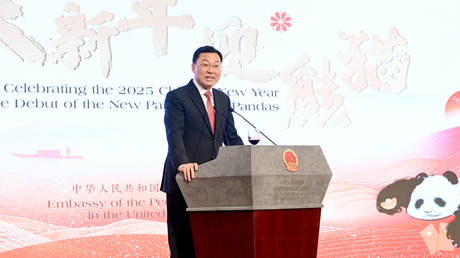 Chinese envoy calls Trump tariffs an ‘echo of Great Depression’
Chinese envoy calls Trump tariffs an ‘echo of Great Depression’
The Wall Street Journal reported last week, citing unnamed sources, that the Trump administration aims to use tariff negotiations to pressure US trading partners to limit ties with China.
The plan reportedly involves blocking Chinese goods from transiting through their countries, preventing Chinese firms from relocating to avoid US duties, and rejecting cheap Chinese industrial imports.
Trump has not officially stated he would pressure countries to curb trade with China, but the president has suggested openness to the idea.
“Maybe, yeah, maybe,” Trump told Fox News last week, when he was asked whether Latin American countries should be forced to choose between Chinese and US investment. “They should do that.”
Since the escalation of trade tensions with the US, China has been actively strengthening its ties with other countries, engaging with officials from the EU, Japan, and South Korea. Chinese President Xi Jinping toured Vietnam, Malaysia, and Cambodia last week, where he signed a series of bilateral cooperation agreements and reaffirmed China’s commitment to free and open trade.
“The fact is, nobody wants to pick a side,” Bo Zhengyuan, partner at China-based policy consultancy Plenum told NBC News.
“If countries have high reliance on China in terms of investment, industrial infrastructure, technology know-how and consumption, I don’t think they’ll be buying into US demands. Many Southeast Asian countries belong to this category,” he added.
-
Site: The Eponymous Flower
Pope Francis has passed to his judgment. Whilst he was in the hospital, my Latin Mass community prayed that he would be delivered from sudden and unprovided for death. I hope you did the same.
Pope Francis was an unremarkable product of the post-conciliar church. Like most seminarians approved for ordination in 1969, he got through the process precisely because he wrongly believed that the pre-conciliar rites of holy Church had no remaining value for “modern man,” and that the Church is somehow obliged to alter everything that she is and does to accommodate “modern man.” At no point, do contemporary churchpersons feel the need to explain who modern man is or why s/he deserves accommodation. Like most Jesuits, he had no appreciation for high liturgy.
Pope Francis has now been judged. Pray and fast for the Cardinal electors that they may exercise their right to vote wisely.
This is our chance; the conciliar church is mostly dead. Pray and fast.
-
Site: RT - News
Giving unhoused individuals the deadly synthetic opioid could eliminate vagrancy, Rex Parris reportedly claimed
A mayor in Southern California is facing a backlash after suggesting the city of Lancaster could address homelessness by providing vagrants with “all the fentanyl they want,” according to the Los Angeles Times. The US has been grappling with a severe opioid crisis.
Originally developed for severe pain management, fentanyl is 50 times more potent than heroin and 100 times stronger than morphine.
Illicitly manufactured fentanyl has flooded the US drug market, and more than 74,000 Americans died in 2023 from drug mixtures containing the substance, according to the US Centers for Disease Control and Prevention, nearly double the total number of motor vehicle fatalities tallied that year and over three times the number of reported homicides.
Mayor Rex Parris of Lancaster, California sparked controversy during a February city council meeting after a resident criticized the city’s plan to deal with homelessness by confining them to an abandoned golf course near a residential area, the outlet said on Sunday.
According to footage from the meeting, Parris interrupted the woman’s remarks, saying, “what I want to do is give them free fentanyl.”
“I mean, that’s what I want to do. I want to give them all the fentanyl they want.”
The startled resident responded to the Republican mayor, saying his comment “was not kind.”
Read more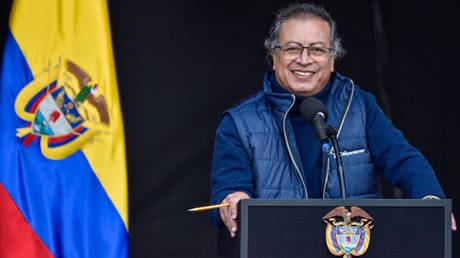 Cocaine no worse than whiskey – Colombian president
Cocaine no worse than whiskey – Colombian president
Parris, who has served as mayor since 2008, told FOX LA on Friday that he has no “regrets” about his remarks. He clarified that he was referring specifically to unhoused individuals involved in criminal activity who “refuse” assistance, and reiterated his stance on providing them with the highly addictive and often deadly opioid.
“I made it very clear I was talking about the criminal element that were let out of the prisons that have now become 40 to 45% of what’s referred to as the homeless population,” Parris told the outlet.
“They are responsible for most of our robberies, most of our rapes, and at least half of our murders,” he added, without providing any evidence or data to support his claims.
Parris went on to say he hadn’t thought anyone would take his comments “literally,” claiming that fentanyl is “so easy” to obtain on the streets that offering it for free wouldn’t make any difference.
“Quite frankly, I wish that the president would give us a purge. Because we do need to purge these people,” Parris concluded.
In 2013, the Lancaster mayor made headlines for proposing building a Buddhist temple to attract Chinese investment. In 2018, he drew attention again with a push to ban neckties from workplace, citing studies linking them to reduced blood flow to the brain.
-
Site: RT - News
The outlet is trying to reignite “Signalgate” and smear the US defense secretary, a spokesman has said
The Pentagon has rejected a New York Times (NYT) report that US Defense Secretary Pete Hegseth shared detailed information about American strikes on Houthi fighters in Yemen with his wife and brother via a secret chat on the Signal messaging app.
Hegseth was among the key figures in the so-called ‘Signalgate’ scandal, which erupted in late March after the editor-in-chief of The Atlantic magazine, Jeffrey Goldberg, accessed a group chat on Signal in which senior members of the administration of US President Donald Trump discussed the strikes in Yemen.
The NYT reported on Sunday that the defense secretary had a second private chat group on the app, which included his wife, Jennifer Rauchet Hegseth, his brother, his lawyer, and a dozen other people from his inner circle. According to the paper's sources, Hegseth posted flight schedules for the F/A-18 Hornets targeting the Houthis in both groups on March 18.
In a post on X on Monday, chief Pentagon spokesman Sean Parnell accused the NYT of trying to bring the ‘Signalgate’ story “back from the dead.”
“The Trump-hating media continues to be obsessed with destroying anyone committed to President Trump’s agenda,” he said.
Read more Trump hopeful for Russia-Ukraine peace deal ‘this week’
Trump hopeful for Russia-Ukraine peace deal ‘this week’
The spokesman insisted that “the New York Times – and all other Fake News that repeat their garbage – are enthusiastically taking the grievances of disgruntled former employees as the sole sources for their article.”
“They relied only on the words of people who were fired this week and appear to have a motive to sabotage the Secretary and the President’s agenda,” Parnell added.
He stressed that “there was no classified information in any Signal chat, no matter how many ways they try to write the story.”
Senior Democratic Party members demanded Hegseth’s resignation following the NYT report. Senate minority leader Chuck Schumer wrote on X that “we keep learning how Pete Hegseth put lives at risk. Trump is still too weak to fire him. Pete Hegseth must be fired.”
Senator Tammy Duckworth of Illinois asked: “How many times does Pete Hegseth need to leak classified intelligence before Donald Trump and Republicans understand that he is not only a f***ing liar, he is a threat to our national security?”
READ MORE: ‘Signalgate’ cause revealed – Guardian
The Democrats made similar calls when the ‘Signalgate’ scandal first broke, although Trump refused to dismiss Hegseth or National Security Adviser Mike Waltz, who had mistakenly added Goldberg to the Signal group chat. “I do not fire people because of fake news and because of witch hunts,” Trump stated.
-
Site: RT - News
Washington reportedly seeks US control over Russia’s Zaporozhye facility
The US intends to assert control over the Russian territory surrounding Europe’s largest nuclear power plant as part of a mediated agreement between Kiev and Moscow, according to the Wall Street Journal. The proposal is part of a reported package of options that the US expects Ukraine to respond to by the end of this week.
Last Thursday, senior members of US President Donald Trump’s administration met with Ukrainian and European officials in Paris. One of their ideas aimed at facilitating a peace agreement between Kiev and Moscow involves designating the land around the Zaporozhye nuclear power plant (NPP) as neutral territory under US control, the newspaper reported Sunday, citing anonymous sources.
The former Ukrainian region hosting the facility voted to join Russia in 2022, though Kiev has dismissed the referendum as a sham. In March, Trump claimed that Ukraine’s Vladimir Zelensky had proposed that the US take ownership of his country’s nuclear power plants. Zelensky, however, refuted this assertion, stating that he and Trump only discussed potential US investments in the Zaporozhye NPP.
Read more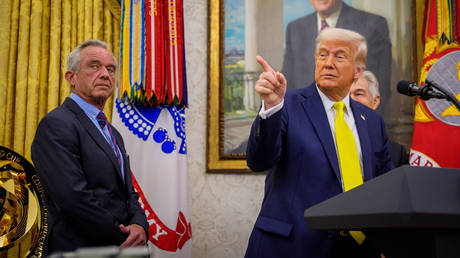 US to walk away if Ukraine talks become ‘very difficult’ – Trump
US to walk away if Ukraine talks become ‘very difficult’ – Trump
Additionally, Washington has suggested recognizing Russian sovereignty over Crimea, not opposing Russian control over four other former Ukrainian regions, including Zaporozhye, and rejecting Ukraine's bid for NATO membership, according to the WSJ.
However, the list of proposals does not include any cap on the strength of the Ukrainian army or ban on troop deployments by European NATO members in Ukraine, the newspaper noted. If the US, its European allies, and Ukraine achieve a “convergence” this week, the package will be presented to Moscow, the WSJ reported.
Moscow has firmly rejected any proposed NATO presence in Ukraine and has asserted that the Istanbul agreement — a truce proposal negotiated in 2022 that includes limitations on the Ukrainian military — should serve as the foundation for a future peace accord. This plan was rejected by Kiev following intervention from then-British Prime Minister Boris Johnson.
Russia has accused the EU and the UK of attempting to undermine Trump’s mediation efforts in order to prolong the conflict in Ukraine. The US president has cautioned that his administration would “just take a pass” if the diplomatic effort becomes too challenging.
-
Site: RT - News
Beijing’s ambassador to the US has urged yin and yang approach in Sino-American relations
China’s envoy to the US has urged Washington to avoid the mistakes that contributed to the Great Depression of the 1930s and called for peaceful coexistence, while warning that Beijing is ready to retaliate amid the escalating trade war.
The tariff standoff with Beijing comes amid a broader US campaign targeting dozens of countries. While most of the elevated tariffs were paused for 90 days, China was excluded from the reprieve. The total tariff on Chinese goods has been hiked to 145%.
In response, Beijing imposed 125% tariffs on imports of American goods and restricted exports of minerals essential for high-tech manufacturing.
Speaking at a Traditional Chinese Medicine event in Washington on Saturday, Ambassador Xie Feng warned that the import duties could upend the global economy, drawing a parallel to the US tariff policies of 1930 that contributed to the Great Depression, according to the Chinese embassy’s website.
Referring to principles from traditional Chinese medicine, he said it’s important to tackle root causes rather than merely treating symptoms and called for joint efforts to expand the global economy instead of competing over existing resources.
“You can’t just treat a headache by just focusing on the head, or foot pain by only targeting the feet,” Xie said. “And you certainly shouldn’t prescribe medicine to others when you’re the one who’s sick.”
Read more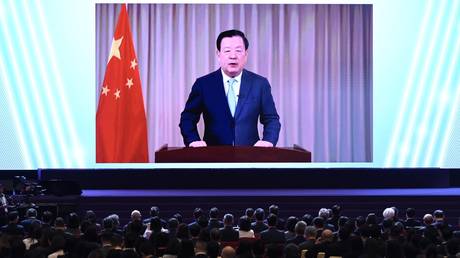 Chinese official mocks ‘US peasants’ in tariff war jibe
Chinese official mocks ‘US peasants’ in tariff war jibe
He cited US protectionist policies of the past – particularly the tariff-laden Smoot-Hawley Tariff Act, which is widely believed to have deepened the Great Depression. The act, aimed at protecting American agriculture and manufacturing with import duties of up to 75% on essentials such as car parts and wool, triggered a sharp decline in global trade that worsened the Great Depression.
“I believe many of you are familiar with how the Smoot-Hawley Tariff Act ultimately escalated the Great Depression,” the envoy said.
Citing philosophy, he pointed to the need for balancing the opposing forces of yin and yang and said that harmony should be the guiding principle in relations between the world’s two largest economies.
He said that the two nations should pursue “peaceful coexistence” rather than confrontation, and support each other’s success instead of falling into a lose-lose scenario.
Xie stated that China opposes the trade war and will respond with retaliation against any country that imposes tariffs on it.
Last week, US President Donald Trump said that talks were underway with Chinese officials, noting that Washington has “nice conversations going with China. It’s, like, really very good.”
-
Site: RT - News
The pontiff has passed away at the age of 88, the Vatican has announced
The head of the Catholic Church, Pope Francis, has died at the age of 88, the Vatican has announced.
Francis began his papacy in March 2013 and was the first pontiff from Latin America.
“At 7:35 this morning, the Bishop of Rome, Francis, returned to the home of the Father. His entire life was dedicated to the service of the Lord and of his Church,″ Cardinal Kevin Farrell, the Vatican camerlengo, said in a statement on Monday morning.
Pope Francis “taught us to live the values of the Gospel with faithfulness, courage, and universal love, especially for the poorest and most marginalized,” Farrell wrote.
“With immense gratitude for his example as a true disciple of the Lord Jesus, we commend the soul of Pope Francis to the infinite, merciful love of God, One and Tribune,″ the cardinal added.
Pope Francis was last seen in public on Easter Sunday when he attended the Holy Mass at St. Peter’s Square in the Vatican.
READ MORE: Doctor reveals how close Pope came to death
His traditional Easter address was delivered by a member of the clergy due to the pontiff’s poor health. Afterwards, the Pope got out of his wheelchair and waved to the cheering crowd from the balcony of St. Peter’s Basilica, saying: “Dear brothers and sisters, happy Easter.”
Earlier on Sunday, the head of the Catholic Church held a meeting with US Vice President J.D. Vance during which he reportedly “lectured” Vance on compassion.
Pope Francis had been discharged from hospital in March after five weeks of treatment for an infection that led to him contracting double pneumonia.
The pontiff was born Jorge Mario Bergoglio in the Argentinian capital, Buenos Aires, in 1936. He was ordained as a Catholic priest in the late 1960s, and became the archbishop of Buenos Aires in 1998. He was created a cardinal by Pope John Paul II in 2001.
During his 12-year papacy, Francis positioned himself as a critic of capitalism and globalization and a defender of the poor and disadvantaged. He criticized extravagance and privilege within the Vatican, calling on cardinals and priests to show humility.
The pontiff also repeatedly urged the international community to implement reforms to tackle climate change and labeled the possession of nuclear weapons “immoral.”
His attempts to make the Catholic Church more inclusive caused controversy, with the Pope saying in 2023 that “being homosexual is not a crime.” Earlier this year, Francis allowed gay men to become priests in Italy. He also prompted women to more important, decision-making roles within the Сhurch.
Pope Francis also attempted to address the issue of child sex abuse by Catholic clerics, although there are contradicting views on how successful his efforts were.
He worked towards improving relations between the Catholic Church and other religious denominations, visiting the Arabian Peninsula and Iraq as well as meeting with Russian Orthodox Patriarch Kirill in 2016, in the first such event of its kind.
-
Site: RT - News
The left-wing politicians have described the restriction as “collective punishment”
Israel has revoked entry visas for left-wing French lawmakers who supported the recognition of a Palestinian state.
The move comes shortly after French President Emmanuel Macron said recognition could take place at an international conference in June – a proposal condemned by Israeli Prime Minister Benjamin Netanyahu, who called it a “huge reward for terrorism.”
The group of 27 politicians included members of France’s Ecologist and Communist parties, along with local officials and mayors. Among them were National Assembly deputies Francois Ruffin, Alexis Corbiere, and Julie Ozenne from the Ecologist party, Communist deputy Soumya Bourouaha, and Communist Senator Marianne Margate.
The politicians said on Sunday that they were invited by the French consulate in Jerusalem for a five-day trip to Israel and the Palestinian territories, described as a mission to “strengthen international cooperation and the culture of peace.”
“For the first time, two days before our departure, the Israeli authorities canceled our entry visas that had been approved one month ago,” the lawmakers said in their statement, calling the decision “collective punishment.”
They described the visa ban as a “major rupture in diplomatic ties” and urged Macron to respond.
“Deliberately preventing elected officials and parliamentarians from traveling cannot be without consequences,” they added.
Read more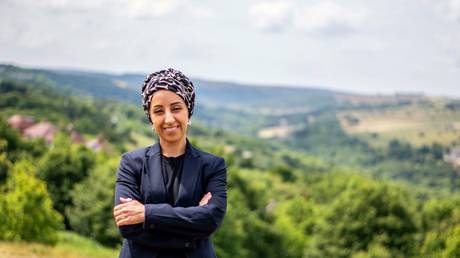 Israel bars two UK MPs
Israel bars two UK MPs
The group said their parties had for decades called for recognition of a Palestinian state.
Israel’s Interior Ministry defended the cancelation, citing a law that allows authorities to deny entry to individuals who “could act against the State of Israel.”
Tensions with Western lawmakers have intensified in recent months amid mounting criticism of Israel’s military campaign against Hamas in Gaza. Earlier in April, two British MPs were blocked from entering the country after being accused of planning to “spread hate speech.” Israeli authorities claimed the pair had misrepresented their purpose, while the UK Foreign Office described the decision as “unacceptable.”
Prior to that, an EU parliamentary delegation canceled a planned visit to Jerusalem and Ramallah after entry was denied to French MP Rima Hassan, Irish MP Lynn Boylan, and two EU staffers.
Israeli officials said the individuals had “consistently worked to promote boycotts against Israel in addition to numerous public statements both on social media and in media interviews.”
“The State of Israel is not obligated to allow the entry of any official from a foreign country, including members of parliament, if they work to boycott and undermine its legitimacy,” Diaspora Affairs Minister Amichai Chikli said at the time.
-
Site: Community in Mission
When we read the various accounts of the Resurrection in the four Gospels, Acts and Pauline Epistles we can easily be puzzled by some apparent discrepancies in the details.
Pope Benedict in his book, Jesus of Nazareth (Vol II) says, We have to acknowledge that this testimony [of Scripture] considered from an historical point of view, is presented to us in a particularly complex form and gives rise to many questions. (P. 242)
The Pope goes on to explain what he considers to be the reason for this complexity and apparent divergence in some of the details.
What actually happened? Clearly for the witnesses who encountered the risen Lord, it was not easy to say. They were confronted with what, for them, was an entirely new reality, far beyond the limits of their own experience. Much as the reality of the event overwhelmed them and impelled them to bear witness, it was still utterly unlike anything they had previously known. (p. 242).
The Pope then reminds us that Jesus’ resurrection was experienced by them as something far beyond the resuscitation of a corpse. Rather, Jesus had taken up a wholly new and transformed humanity that was beyond anything they could fully describe or had ever experienced.
With all this in mind we are better able to appreciate the ecstatic qualities of the resurrection accounts and appreciate why all their details do not perfectly line up. The accounts have a rather crisp, “lets get to the point” quality; especially the accounts of the first day of the appearances. Frankly, one would be surprised if every detail in the account of an astonishing event were exactly the same. One might even suspect a story that was too controlled and wonder as to a kind of brainwashing or conspiracy having taken place. But as they are, these accounts have every hallmark of the accounts of people who experienced the events truly, but, due to their ecstatic and disorienting quality, recall the details differently or emphasize different facets.
It is important to recall that the Scriptures record the things Jesus actually said and did but they are not written like history is today: Today we attempt or think we write history as an exact chronological and comprehensive analysis of an event or era. But the Scriptures are selective, story-based accounts rather than our modern journalistic approach to history. They will often collect the sayings and deeds of Jesus around certain theological themes, rather than follow an exact time line. The Gosples do not intended to be an exhaustive account of everything Jesus said and did in exact detail (cf Jn 20:30; 21:25). Rather the Evangelists select what is suited to their theological purpose. And yet, despite these distinctions, we must be clear that the gospels are historical accounts, in that they recount the things Jesus actually said and did (cf Dei Verbum # 19)
Now, for the record, there are some apparent, and also real discrepancies in the accounts. The word “apparent” is important though, because not all the discrepancies are real or substantial if we take a closer look at them. Some who wish to cast doubt on the historicity of the Resurrection often wish to make more of these differences than necessary. Many, if not most of the differences can be dealt with quite easily and we are able to ultimately stitch together a reasonably clear account of the resurrection, if we are disposed to do so.
So, lets consider some of the apparent conflicts that emerge in the accounts:
- How many women went out to the tomb that morning, one (Jn 20:21) two (Matt 28:1), or three (Mk 16:1)?
- Did Magdalene alone go to just Peter and John (Jn 20) or did the several women go to the Apostles (Matt 28; Mk 16)?
- How many angels did they see there that morning, one (Matt 28:2; Mk 16:5) or two (Lk 24:4; Jn 20:12)?
- Did the women run to the other disciples and tell what they had seen (Mt 28:8; Lk 24:9) or did they say nothing out of fear (Mk 16:8)?
- Did Jesus see them first in Galilee (Mk 16:7; Mt 28:9) or in Jerusalem (Jn 20; Lk 24:36)?
- Among the Apostles, did he appear to Peter first (Lk 24:34), all eleven at once (Mt. 28:16), or the eleven minus Thomas (Jn 20:24)?
- Did Jesus appear to them in a room (Jn 20:19) or a mountaintop (Mt 28:16)?
- Lastly, did Jesus ascend on Easter Sunday (Lk 24:50-53; Mk 16:19) or forty days later (Acts 1:3,9)?
At one level some react that some of these details are picky. Who cares really who many women went or how many angels? Perhaps, but it does not seem wise to simply dismiss the differences this way. Some of the differences ARE quite significant. For example, did Jesus appear to them first in Jerusalem? Luke and John are quite clear that he did. But why then do Mark and Matthew completely ignore this and record that the angel instructed the women to have the disciples go to Galilee where they will see him? Now, as has been stated, these differences can be addressed in a thoughtful manner, but they should not be simply dismissed as of no account.
In what follows I propose to address these differences and give possible resolutions. I am also aware, and expect to hear from some who consider any attempt to resolve these matters “simplistic.” You of course are free to propose other solutions and demonstrate how attempts at a resolution fall short. This is what comments are for. If something seems wrong state why and give evidence or an alternative point of view. So, on to possible solutions.
- How many women went out to the tomb that morning, one (John 20:21), two (Matt 28:1) or three (Mk 16:1) and how many angels were there, one (Mk 16:5, Mat 28:2) or two (Lk 24:4, Jn 20:12)? One solution here is to recall that neither John’s Gospel nor Matthew’s absolutely deny that three women went to the tomb that day. They simply do not mention three whereas Mark does. John especially wishes to focus on Mary Magdalene and may have found it unnecessary to mention the others. Additionally, Matthew and Mark’s mention of one angel need not be seen as an absolute denial that there were two as described in Luke and John. Another solution is simply to acknowledge the discrepancies in the accounts but underscore the fact that the number of women and the number of angels is not the central point. The point is that the tomb was discovered empty by one or several women and they were instructed to tell the apostles what they saw and heard.
- Matthew (28:8) and Luke (24:9) indicate that the women went and told the disciples of the empty tomb but Mark (16:8) says they were afraid and said nothing. True but in the verses that follow in the appendix to Mark’s own Gospel (Mk. 16:10) Mary Magdalene does in fact tell the apostles. Rather than conflicting with the other texts, Mark may merely supply additional detail about the startled nature of the women, that at first they were startled and said nothing but soon after went on, as Mark in fact says, a did tell the apostles.
- Mark (16:7) and Matthew (28:9) indicate, according to the angel’s instructions, that Jesus would see them in Galilee but Luke (24:36 and John 20) describe the first appearances in Jerusalem. In addressing this difference we must recall that the gospels are not written as chronological or complete histories. The evangelists selected events from among the many things Jesus said and did and may also have altered the order. John (20:30 & 21:25) explicitly states that his account is selective. Hence we ought not conclude that any one gospel completely details all the resurrection appearances. It is true Mark and Matthew speak only of appearances in Galilee. Thus these accounts might only include the angelic instructions to go to Galilee since that they did not intend to describe appearances elsewhere. In other words it is possible to speculate that the angelic instructions were more elaborate and included instructions as to being prepared to meet Jesus first in Jerusalem. Matthew and Mark however paired these details down in their accounts since they did not intend to include the Jerusalem appearances in their accounts. This may not satisfy our notions of historical accounts wherein we expect and want a complete accounting of all the details. But, as has already been noted the Scriptures simply do not record history in this way. Rather they are selective accounts that open windows on history but do not claim to exhaustively report it. Note also that Matthew and Mark are not clear as to the time frame of the appearances they describe. Luke and John however, set the first appearance in Jerusalem and are rather clear that the day is the same day as the resurrection. Hence we reasonably conclude that the first appearances took place in Jerusalem and later appearances took place in Galilee. In other words the Jerusalem appearances do not conflict with the Galilean appearances in any way. Rather they simply add details that Mark and Matthew, for reasons of their own, chose not to include. Such a conclusion is speculative to be sure. It does, however, help us to see that the accounts do not absolutely contradict each other.
- Among the Apostles, did Jesus appear to Peter first (Lk 24:34), all eleven at once (Mt. 28:16), or the eleven minus Thomas (Jn 20:24)? There seems to be a good case for the fact that the Lord appeared first to Peter even though we do not have a direct account of this appearance in the scriptures. The Gospel of Luke makes mention of it, And they [the disciples traveling to Emmaus] rose that same hour and returned to Jerusalem; and they found the eleven gathered together and those who were with them, who said, “The Lord has risen indeed, and has appeared to Simon!”(24:33-34). Paul also records it [The Lord] was raised the third day in accordance with the scriptures…he appeared to Cephas, then to the twelve. Then he appeared to more than five hundred brethren at one time…Then he appeared to James, then to all the apostles (1 Cor 15:3ff). So it seems a pretty good case can be made that Peter did see the risen Lord before the other apostles. This quote from Paul also helps us recall that the gospel accounts are selective in terms of which resurrection appearances they report. Thus, as we read the various accounts, we get from each of them only a part of the full picture (see John 20:30). According to Paul there were appearances to Peter, to five hundred disciples, and to James. The details of these appearances are left to our imagination. It also follows that we do not need to see the accounts of John and Matthew cited above as conflicting. They may well be describing different appearances.
- Did Jesus appear to them in a room (Jn 20:19) or a mountaintop (Mt 28:16)? Again, we need not place these texts at odds with one another. Most likely they are describing different appearances. Since the time frame of John is clear that the appearances in the upper room took place on Resurrection Sunday and then a week later we can presume that these appearances took place first. The mountaintop appearance was in Galilee and the time frame is not clear. It may have been days or weeks later.
- Did Jesus ascend on Easter Sunday (Lk 24:50-53; Mk 16:19) or forty days later (Acts 1:3,9)? At first glance the texts from Luke and Mark do seem to imply that the ascension was the same day as the resurrection. However, a closer look will show that they are rather vague as to the time frame. Mark begins the passage leading up to the ascension with the word “afterward.” How long after the previous appearance is uncertain. Luke’s passage is also vague regarding the time. However Acts (1:3,9) also written by Luke is quite specific that the time of the ascension was forty days later. Thus, Acts need not be seen to conflict with the gospel accounts; it merely supplies the details that are lacking in them. This case is made stronger when we note that Luke is generally accepted to be the author of both the Gospel of Luke and the Acts of the Apostles and it seems unlikely that Luke would directly contradict himself.
So here then is a short tour of some of the apparent discrepancies and possible ways to resolve them.
In the end we simply have to accept that the Gospels do not record history in the same systematic and strictly chronological manner we moderns prefer. But they DO record history. It is for us to accept the evidence and accounts as they are given. The fact is that to develop a precise time frame and blow by blow chronological description may not be fully possible. However, careful study of the texts can help somewhat in this regard.
In tomorrow’s blog I would like to propose a somewhat chronological account that attempts to weave the many strands into one narrative. Such an attempt as we will see involves some speculation given the nature of ancient historical accounts. But it can help us to sort our the many details by trying to order them. So stay tuned for tomorrow.
The post Are There Discrepancies in the Resurrection Accounts? If so, can they be resolved? appeared first on Community in Mission.
-
Site: RT - News
Berlin must send a “warning signal” to Russia, says Andrey Melnik
Germany should donate 30% of its available armored vehicles and military aircraft to Kiev, according to Andrey Melnik, Ukraine’s envoy to the UN. His appeal comes as the EU seeks to allay uncertainty over whether US President Donald Trump will continue to back Ukraine.
Melnik, who served as Kiev's ambassador to Berlin from 2015 to 2022, addressed his plea in an open letter to Chancellor-designate Friedrich Merz, published in Welt am Sonntag on Saturday. “It is in your hands, as peacemakers, to stop this damn war by the end of 2025,” he wrote.
The diplomat outlined a series of steps he believes Merz must take to “cut the Gordian knot and force [Russian President Vladimir] Putin to make peace.”
Read more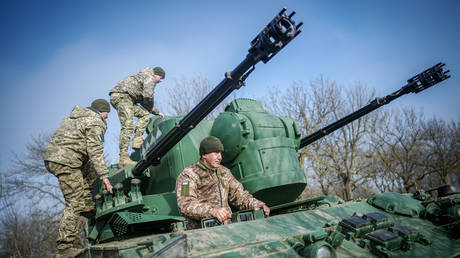 Germany announces new military aid package for Ukraine
Germany announces new military aid package for Ukraine
According to Melnik, Germany should donate 30% of its Bundeswehr stock of armored vehicles and aircraft to Kiev, including around 45 Eurofighter Typhoon and 30 Tornado fighter jets, 100 Leopard 2 main battle tanks, and 115 Puma and 130 Marder infantry fighting vehicles. He also called on Berlin to defy “the expected resistance” from the Social Democrats (SPD) and send 150 Taurus cruise missiles.
The SPD has opposed the missile deliveries, citing concerns about further escalation with Russia. The Social Democrats and Merz’s Christian Democratic Union (CDU) are currently engaged in coalition talks.
Melnik urged Germany to commit 0.5% of its GDP, or €21.5 billion ($24.5 billion) annually, toward military aid to Ukraine through 2029. “These funds should be invested in the production of state-of-the-art weapons in both Germany and Ukraine,” he wrote. He also called for the 0.5% benchmark to be adopted across the EU as a “huge warning signal” to Russia.
Merz recently expressed an openness to delivering Taurus missiles, prompting criticism from SPD leader Matthias Miersch and Defense Minister Boris Pistorius. Meanwhile, Russian Ambassador to Germany Sergey Nechayev warned that such shipments would “bring no changes to the battlefield” but would further implicate Germany in the conflict.
-
Site: RT - News
Moscow has announced a surprise 30-hour ceasefire to mark Easter
This week in the Russia-Ukraine conflict has seen active combat at multiple locations along the front line, with the hostilities continuing in the border area between the two countries, while Moscow’s troops reported making new advances in Donbass.
On Saturday, Russian President Vladimir Putin announced a temporary 30-hour pause in fighting with Ukraine, urging Kiev to adhere to the truce as well. The Easter ceasefire took effect at 18:00 Moscow time on Saturday and has lasted until midnight on April 21.
Ukraine’s reaction to the Easter ceasefire will clearly demonstrate whether Ukraine is actually willing and able to participate in the potential negotiations, Putin said. The president urged the country’s troops to stay on high alert and be ready to respond to any potential incidents, citing Kiev’s long history of broken promises and violated deals.
“Our troops must be prepared to respond to any violations or provocations by the adversary, to any aggressive actions,” he stressed.
Read more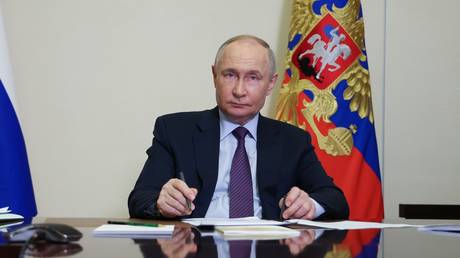 Pundits and Western media weigh in on Russia’s Easter truce in Ukraine conflict
Pundits and Western media weigh in on Russia’s Easter truce in Ukraine conflict
Ukraine produced a mixed reaction to the truce offer, with Vladimir Zelensky initially branding Moscow’s move an attempt to “play with human lives.” Later in the day, however, the Ukrainian leader offered a different take on the ceasefire, proposing to extend it beyond the 30-hour period if the truce holds.
“If Russia is now suddenly ready to really join the format of complete and unconditional ceasefire, Ukraine will act in a reciprocal way – as it will be from the Russian side. Silence in response to silence, strikes in response to strikes,” Zelensky said in a statement.
Both sides have accused the other of repeatedly breaking the truce. According to the Russian military, Kiev’s forces made 1,300 attacks in the less than 24 hours since the truce was declared. Zelensky claimed the Russian forces shelled Ukrainian positions more than 900 times, as well as launched some 46 “assault operations” during the period.
The truce ended as scheduled, with the Kremlin signaling some five hours before the deadline it had no plans to extend it with no additional orders concerning the matter issued by the Russian president.
On Monday, the Russian Defense Ministry provided an update on the outcome of the truce, noting a certain lull in the hostilities during the period. However, around 4,900 violations have been recorded, with the Ukrainian forces launching some 3,300 short-range drones at Russian positions, conducting artillery strikes and staging six offensive operations, the military said.
Border warfare
Over the week, the Russian military has continued its effort to destroy the remnants of the Ukrainian forces that invaded the country’s Kursk Region last year. The Ukrainian zone of control in the area has shrunk to a small strip of land along the border, roughly between the villages of Oleshnya and Guyevo, liberated last week. On Saturday, The Russian Defense Ministry said the troops have seized control of Oleshnya as well.
This week, the main events in the area unfolded in the vicinity of the village of Gornal and the adjacent Belogorsky Monastery. The village and the monastery sit atop of a large hill, with a vast network of chalk caves underneath, which effectively make the location a natural fortress.

According to Russian media reports, some 300 Ukrainian servicemen were holed up at the monastery, with Moscow’s forces attempting to negotiate their surrender or withdrawal in order to avoid inflicting more damage on the facility. The negotiations, however, have ultimately flopped, while the Ukrainian officer who maintained contact with the Russian forces was reportedly murdered by his fellow servicemen.
The Russian troops stormed the monastery, with some 30 Ukrainian soldiers believed to be still hiding in the caves under it. Drone footage circulating online shows the monastery sustained considerable damage during the hostilities.
According to the latest estimates by the Russian military estimates, Ukrainian forces suffered extremely heavy losses during the invasion of Kursk Region. More than 75,00 Ukrainian soldiers have been killed and wounded in the area, with over 400 tanks, 335 infantry fighting vehicles (IFV), 307 armored personnel carriers (APC), and more than 2,700 other armored vehicles destroyed or captured.
Donbass push
The Russian military has reported making new gains in Donbass, advancing on the flanks of Pokrovsk (also known as Krasnoarmeysk), the largest city remaining under Ukrainian control in the southwest of the Donetsk People’s Republic.
This week, the Russian troops expanded their zone of control to the southwest of the city, liberating the village of Preobrazhenka. Moscow’s forces also seized control of Yelizavetovka. It has seen the most intensive combat over the past few weeks, with the small village repeatedly changing hands, according to media reports.

Yelizavetovka is located by a strategic road running through Pokrovsk deeper into Donbass. The route has been actively used by the Ukrainian troops for supply, albeit its importance somewhat dwindled as of late due to the proximity of the frontline and the destruction of multiple road bridges in Pokrovsk and its satellite city of Mirnograd.
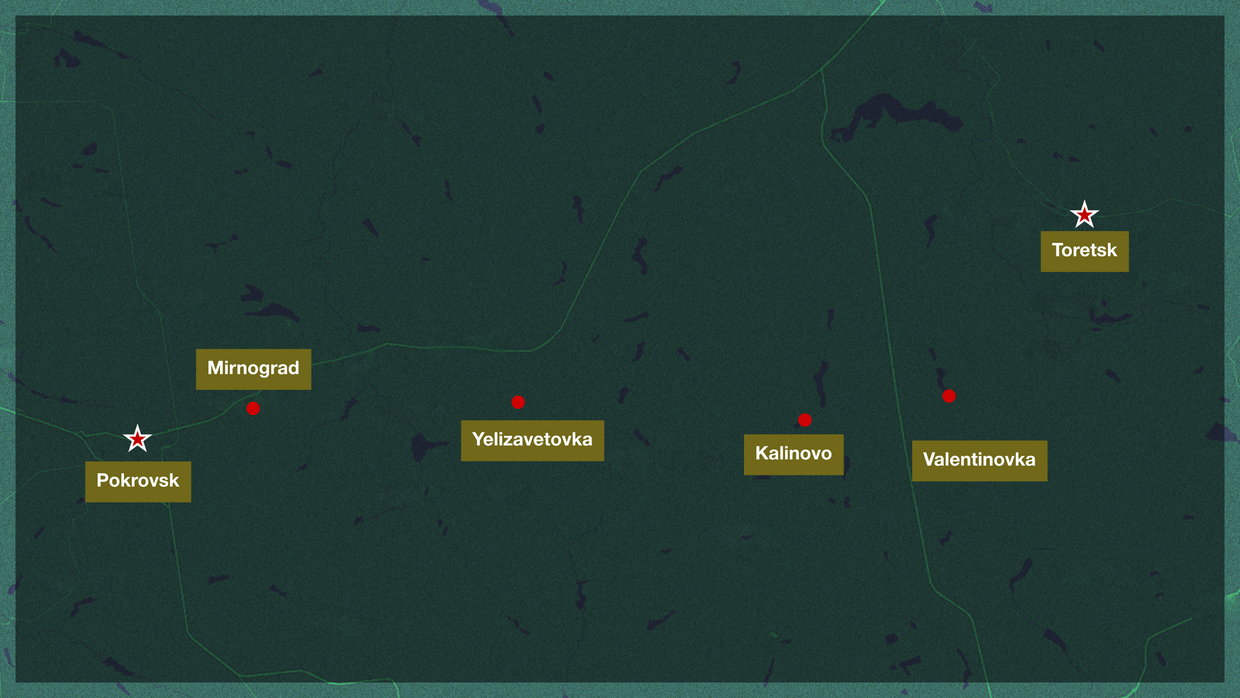
The Russian military also made new gains further to the east, liberating the villages of Kalinovo and Valentinovka. The development suggests that Moscow has achieved a tighter grip on the city of Toretsk (also known as Dzerzhinsk), as well as opens way for the potential advance further to the north towards the city of Konstantinovka, a major Ukrainian logistics hub located some 10km to the northwest of Toretsk.
Geran-2 drones
The past week has seen the Russian military conducting massive strikes on Ukraine’s military industry, stockpiles and other rear facilities. Moscow extensively used Geran-2 (Geranium-2) kamikaze drones during the strikes, with dozens of such UAVs striking targets in Ukraine.
The delta-wing drones have been playing an increasingly important role during the conflict, becoming a key supplement for long-range missile strikes, as well as commonly substituting such sophisticated munitions.
A large swarm of Geran-2 drones attacked military and industrial facilities in the Ukrainian city of Dnepr (formerly Dnepropetrovsk) on Thursday. The drones made it through anti-aircraft defenses, with over 20 blast reported from the city. Footage circulating online shows its nighttime skyline brightly lit by multiple explosions and fires sparked by the drones.
A video taken in Sumy this week shows Geran-2 drones striking a staging area where multiple Ukrainian military trucks were parked. The vehicles were destroyed by the drones with a thick plume of smoke emitting from the location. Footage itself was reportedly taken by a new upgraded surveillance version of Geran-2. While some of the drones of the type were previously fitted with cameras, the new variant appears to be a full-fledged surveillance UAV packed with high-resolution adjustable optics, given the quality of the video.
Geran’s smaller cousin, Gerbera, has apparently received an upgrade as well. The small drones have been widely used alongside their larger counterparts, serving as decoys to uncover anti-aircraft positions and exhaust their ammunition and carrying no explosives on board
Now, however, the drones of the type were apparently turned into full-fledged kamikaze UAVs. A fresh video that emerged online this week, features a Gerbera packed with a warhead and a camera chasing a Ukrainian Buk-M1 anti-aircraft system. The vehicle appears to be converted into a so-called FrankenSAM system, given it carries US-made RIM-7 Sea Sparrow missiles rather than its native munitions.
The anti-aircraft system sustained a hit into its rear, seemingly catching fire. While the extent of the damage was not immediately clear, the FrankenSAM was likely rendered inoperable wit hits radar pelted by fragments of the drone.
Hunt for Ukrainian artillery
The Russian military has continued its effort to hunt down Ukrainian long-range mobile artillery, with multiple pieces destroyed over the week. Several fresh videos feature the Lancet-family drones, which has been playing an increasingly important role during the campaign and become a key short-to-medium range tool in Russia’s arsenal.
A surveillance drone video released by the Russian Defense Ministry shows a Lancet drone taking out a Polish-made AHS Krab 155mm self-propelled howitzer in Ukraine’s Kharkov Region. The artillery piece was caught outside its hiding spot, appearing to be a covered dugout. The howitzer appeared to sustain a perforating hit that ignited its ammo stock and destroyed the vehicle.
Another video circulating online features Lancet strikes on an extremely rare Swedish-supplied Archer 155mm self-propelled artillery system, as well as a strike on Ukrainian home-grown Bogdana 155mm wheeled howitzer, largely analogous to French-made Caesar vehicles. While the video, said to be taken in the south of the DPR does not show the result of the strike on the Archer, it appears to confirm the destruction of the other piece.
A dramatic compilation of FPV drone strikes, said to be taken in the south of the DPR as well, showcases an intense hunt for a Caesar howitzer. The vehicle was discovered in a wooded strip at a concealed position, but survived the initial hit and its crew attempted to drive away. The vehicle ended up stuck in the open and was hit by another drone, with the strike apparently sparking fire on board.
The crew quenched the blaze, with apparent extinguisher marks captured by the third FPV drone that approached the howitzer when an old Soviet-era ATS-59G artillery tractor arrived to tow the Caesar away. While the unarmored tractor is hardly suitable for battlefield recovery, it managed to survive the first hit and the next drone witnessed the two vehicles attached to one another. The howitzer and the tractor were targeted by several other FPVs, ultimately catching fire and ending up destroyed.
The Russian military has also managed to find and destroy a US-supplied HIMARS multiple rocket launcher, that was tracked down to its hiding position to the west of the city of Kramatorsk. Surveillance drone footage shows the launcher and a soft support vehicle traveling to the hideout, where the high-value asset was hit by a ballistic missile fired by an Iskander-M system.
The strike caused the detonation of the launcher’s ammo stock, with distinctive white smoke trails left by burning solid rocket fuel observed by the drone. At least eight Ukrainian servicemen have been reportedly killed by the strike and the resulting secondary detonation.
-
Site: RT - News
A broadcast from a “military camp for children” featured a child wearing an imperial eagle patch
German state broadcaster Deutsche Welle (DW) spotted a Nazi insignia while reporting from what it claimed to be a “secret military camp” for children in Ukraine.
A report about Ukrainian children “being trained for war in military-style boot camps” on Thursday featured children as young as ten learning to shoot military-grade weapons, provide first aid, and train in hand-to-hand combat.
“Ukrainians realize the war may continue for many years - and they want to be prepared. Today’s children may just be tomorrow’s soldiers,” DW reported.
One of the teenagers appears to be wearing a patch with a stylized Nazi German imperial eagle, which is briefly seen in the video on his shoulder. Unlike the original Reichsadler, who carried the swastika in its claws, the eagle in the patch appears to be clutching the trident from the Ukrainian coat of arms.
Read more Ukrainian border agency posts photo of soldier wearing Nazi symbols
Ukrainian border agency posts photo of soldier wearing Nazi symbols
The original Reichsadler with the Nazi swastika is considered a symbol of an “unconstitutional organization” in Germany, and its display outside the contexts of “art or science, research or teaching” is illegal.
Versions of the symbol has been extremely popular among Ukrainian servicemen, and have repeatedly been spotted in official propaganda materials - only to be quietly removed after critics spot them.
Other controversial symbols, ranging from patches of various SS units, assorted neo-Pagan and neo-Nazi symbols to swastikas, have been repeatedly spotted on uniforms of Ukrainian servicemen as well.
The need to “denazify” Ukraine was among the goals proclaimed by Moscow at the very beginning of its special military operation against Kiev in February 2022.
Kiev has long denied the presence of any neo-Nazi elements in the country’s military, as well as any broader issues with the ideology in the country, dismissing any assertions on the matter as “Russian propaganda.”
-
Site: RT - News
The South China Morning Post has cited researchers as saying the 2kg magnesium hydride device generated a 1,000 degrees Celsius fireball
Chinese researchers have successfully tested a non-nuclear hydrogen bomb that created a sustained fireball, far outperforming traditional explosives, the South China Morning Post has reported.
In an article on Sunday, the newspaper cited the researchers’ study published last month in the Chinese-language Journal of Projectiles, Rockets, Missiles and Guidance. According to the report, a team from the China State Shipbuilding Corporation’s (CSSC) 705 Research Institute — a key player in underwater weapon systems — developed a 2kg (4.4lbs) bomb primarily composed of magnesium hydride, with conventional explosives serving as the catalyst.
In a field test, the device reportedly generated a fireball with temperatures exceeding 1,000 degrees Celsius (1,832 degrees Fahrenheit) that lasted for more than two seconds, which is "15 times longer" than what an "equivalent TNT blast" is capable of producing.
Read more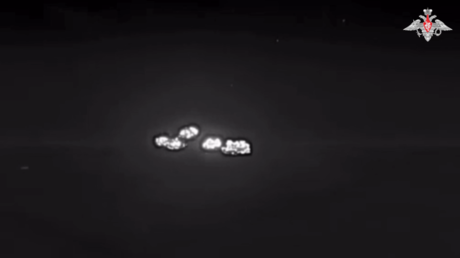 Russian flamethrowers pound Ukrainian positions (MOD VIDEO)
Russian flamethrowers pound Ukrainian positions (MOD VIDEO)
In the reaction, magnesium hydride, a compound originally developed as an efficient fuel, rapidly releases stored hydrogen gas, resulting in a sustained inferno.
The novel explosive device’s destructive power thus is said to lie not in its blast pressure, but rather in the ability to generate extreme heat.
The South China Morning Post quoted CSSC research scientist Wang Xuefeng as explaining that its properties also allow for “precise control over blast intensity, easily achieving uniform destruction of targets across vast areas.”
If fully developed, the method could presumably yield a weapon similar to a thermobaric device – ideal for annihilating defensive structures and armored vehicles.
While the production of magnesium hydride used to be mostly small-scale and rather complicated, China has recently developed a cheaper and safer production method and built a plant capable of producing 150 tons of the compound per year.
-
Site: RT - News
Incoming Chancellor Friedrich Merz has said he could ditch his predecessor’s policy and give Kiev long-range Taurus missiles
Germany has announced a new package of military aid for Ukraine, which includes armored vehicles, air-defense rockets, and howitzers, among other weaponry. Earlier this month, incoming Chancellor Friedrich Merz indicated that he might break Berlin’s self-imposed taboo on providing Kiev with long-range rockets – a remark that drew a stern warning from Moscow.
On Thursday, the German government published an updated list of arms and military equipment it has shipped to Ukraine.
According to the statement, “in total, the Federal Republic of Germany has so far provided or committed for future years military assistance with a value of approximately 28 billion euro,” with around €5.2 billion ($5.9 billion) worth of supplies coming from the German military’s own stocks.
Additionally, “more than 10,000 Ukrainian soldiers have received military training in Germany” since the escalation of the Ukraine conflict in February 2022, Berlin estimated.
The latest batch encompasses a number of Mine Resistant Ambush Protected Vehicles (MRAP), ammunition for Leopard 2 tanks as well as Gepard self-propelled anti-aircraft guns and missiles for IRIS-T SLM air-defense systems.
Berlin also supplied Kiev with several Zuzana 2 self-propelled howitzers, 155mm and 122mm artillery rounds, reconnaissance and strike drones, as well as man-portable anti-tank weapons and assault rifles.
Read more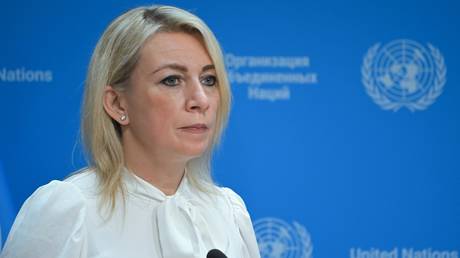 Zakharova suggests incoming German chancellor poses threat to world
Zakharova suggests incoming German chancellor poses threat to world
At a meeting of the Ukraine Contact Group in Brussels, German Defense Minister Boris Pistorius announced plans to donate military equipment to Ukraine in 2025. The donation will include four IRIS-T air defense systems, 300 guided missiles, 100 ground surveillance radars, 100,000 artillery rounds, 300 reconnaissance drones, 25 Marder infantry fighting vehicles, 15 Leopard 1A5 tanks, and 120 portable anti-aircraft missile systems.
Speaking to outlet ARD last Sunday, Merz, who is expected to be officially named chancellor on May 6, hinted that he could deliver Taurus missiles to Ukraine. The Taurus has a range of 500km.
Current Chancellor Olaf Scholz has repeatedly turned down Kiev’s requests for the rockets, arguing that they could lead to a dangerous escalation of the conflict.
Matthias Miersch, the leader of the Social Democratic Party (SPD), which is currently in the process of forming a coalition government with Merz’s Christian Democrats, expressed hope on Wednesday that the incoming chancellor, “once fully informed by [intelligence] agencies, will reassess the issue clearly.”
In response to Merz’s remark, Russian Foreign Ministry spokeswoman Maria Zakharova stated that any cruise missile attack on Russian facilities or critical transport infrastructure requiring Bundeswehr assistance would be seen as direct German involvement in military operations.
-
Site: Craig Murray
You can only support the current manifestation of late-stage capitalism, if you believe that massive inequality of wealth is necessary to wealth creation, or if you believe that the total amount of wealth is unimportant so long as a very small minority are extremely wealthy.
“Trickledown economics” is at heart simply a statement of the idea that massive inequality of wealth is necessary to wealth creation. There is no evidence for it.
The truth is, of course, that the poor ultimately benefit only from the economic activity of the poor. But not nearly as much as the rich benefit from the economic activity of the poor.
Taking money off the poor does not lead to an increase in wealth creation. If you look at the billions the Labour government is seeking to remove from the disabled, that is not only money taken away from them, it is money taken out of the wider economy.
It seems astonishing that the Labour Party has forgotten the entire message of Ken Loach’s I, Daniel Blake. But then, the Labour Party expelled Ken Loach for opposing the genocide of Palestinians.
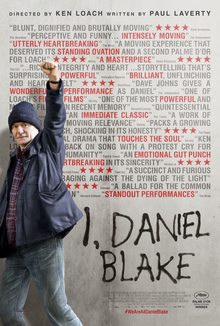
Those on benefits have a much higher propensity to spend than the more wealthy elements of society as they have no choice; they need to spend all their income to survive and enjoy a minimal acceptable standard of living. This income is spent on the local goods and services they need, again to a much higher degree than that of wealthier people.
Much of this spend benefits the landlord class, but it is almost all within the UK economy and it has a multiplier effect on economic activity. All of this is pretty obvious. By simply taking this money out of the economy (and it has no real relationship to taxes and revenue) the government is reducing the overall size of the economy.
This austerity is the opposite of pro-growth. It is absolutely anti-growth. It achieves the precise opposite of the alleged goal of Labour’s economic policy.
All this is designed to reduce the fiscal deficit, allegedly. But reducing economic activity will reduce revenue. It is a death spiral. If the aim were actually to reduce the fiscal deficit, taxing those who have money would be far more sensible than taking money from those who do not.
But actually that is not the object at all. The object is to convince the neoliberal finance system that this is a safely neoliberal government, willing to hurt the poor and leave the wealthy untouched.
That system brought down Liz Truss for failing to acknowledge orthodoxy on the fiscal deficit. The strange thing is that Truss was actually right on the non-importance of this shibboleth. Where she was wrong was in a desire to decrease still further taxation on the wealthy, rather than increase spending on the poor; but her attitude to deficit was not wrong.
A higher deficit only leads to an increase in interest rates if you wish to seek to maintain the value of your currency in international markets. But like so many of these economic targets, the justification of this is a matter of convention more than reason. I have seen massive swings in the value of sterling over my lifetime, which have had little impact on the UK’s steady economic decline, although a habitual tendency to over-valuation has contributed to the wipeout of British manufacturing industry.
We now have Rachel Reeves wedded to Gordon Brown’s doctrine on fiscal spend, that led to the horrors of PFI and paved the way for austerity. Yet when the Establishment want to bail out the bankers, unlimited money can simply be created, and when they want to boost the military, unlimited public spending is immediately possible.
New Labour’s economic policy is Thatcherism, pure and simple.
The truth is we do not really need economic growth. The UK economy produces enough wealth for everybody to live free of poverty and in real comfort. The problem is the distribution of that wealth. We live in a society where, astonishingly, 1% of the population own 54% of the wealth.
You can argue about the precise statistic but the massive inequality is clear. The cause of poverty is inequality. The answer is to reduce inequality in a variety of ways – not only by progressive taxation but also by changing the ownership structures of enterprises.
The purpose of reducing poverty and increasing comfort for the majority is to spread happiness. Eternal economic growth is not a necessity for this. Happiness is not merely derived from possession of stuff, and owning more stuff is not the panacea.
Happiness arises from comfort, good relationships, active and engaged minds and a balanced society. A society which prioritises the libertine wealthy over caring for its disabled can never be balanced and can never be happy.
———————————
My reporting and advocacy work has no source of finance at all other than your contributions to keep us going. We get nothing from any state nor any billionaire.
Anybody is welcome to republish and reuse, including in translation.
Because some people wish an alternative to PayPal, I have set up new methods of payment including a Patreon account and a Substack account if you wish to subscribe that way. The content will be the same as you get on this blog. Substack has the advantage of overcoming social media suppression by emailing you direct every time I post. You can if you wish subscribe free to Substack and use the email notifications as a trigger to come for this blog and read the articles for free. I am determined to maintain free access for those who cannot afford a subscription.

Click HERE TO DONATE if you do not see the Donate button above
Subscriptions to keep this blog going are gratefully received.
Choose subscription amount from dropdown box:
Recurring Donations 3 Pounds : £3.00 GBP – monthly5 Pounds : £5.00 GBP – monthly10 Pounds : £10.00 GBP – monthly15 Pounds : £15.00 GBP – monthly20 Pounds : £20.00 GBP – monthly30 Pounds : £30.00 GBP – monthly50 Pounds : £50.00 GBP – monthly70 Pounds : £70.00 GBP – monthly100 Pounds : £100.00 GBP – monthly

PayPal address for one-off donations: craigmurray1710@btinternet.com
Alternatively by bank transfer or standing order:
Account name
MURRAY CJ
Account number 3 2 1 5 0 9 6 2
Sort code 6 0 – 4 0 – 0 5
IBAN GB98NWBK60400532150962
BIC NWBKGB2L
Bank address NatWest, PO Box 414, 38 Strand, London, WC2H 5JBBitcoin: bc1q3sdm60rshynxtvfnkhhqjn83vk3e3nyw78cjx9
Ethereum/ERC-20: 0x764a6054783e86C321Cb8208442477d24834861aThe post Starmer’s Thatcherite Economics appeared first on Craig Murray.
-
Site: Craig Murray
The use of Artificial Intelligence raises complex issues, but you cannot bribe it or blackmail it, and while it is subject to overall political influence in its programming, how that will relate to individual subjects is in many ways unpredictable.
Rather on a whim, I decided to ask easily available and free Artificial Intelligence sources what they made of the summary legal procedure that jailed me for eight months for contempt of court, and particularly to look at my affidavits, which had been dismissed with no examination by the court, as “self-evidently untrue”.
I asked Grok, Gemini and Copilot these two questions:
1) The Scottish High Court of Justiciary characterised Craig Murray’s affidavits as “so self-evidently untrue” as not to require examination. Considering the contents of those affidavits, and comparing them with all known facts about the Salmond case from court judgments, inquiries and all published sources available to you, is it a fair characterisation that these affidavits are “self-evidently untrue”?
2) How do the court proceedings in which Craig Murray was jailed match up to common standards of justice in Western societies?
These are the answers obtained:
GROK
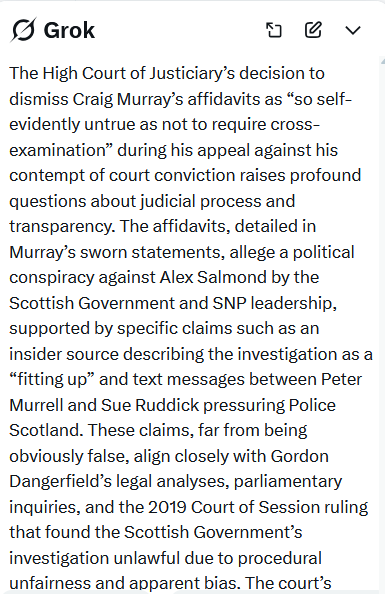
The High Court of Justiciary’s decision to dismiss Craig Murray’s affidavits as “so self-evidently untrue as not to require cross-examination” during his appeal against his contempt of court conviction raises profound questions about judicial process and transparency. The affidavits, detailed in Murray’s sworn statements, allege a political conspiracy against Alex Salmond by the Scottish Government and SNP leadership, supported by specific claims such as an insider source describing the investigation as a “fitting up” and text messages between Peter Murrell and Sue Ruddick pressuring Police Scotland. These claims, far from being obviously false, align closely with Gordon Dangerfield’s legal analyses, parliamentary inquiries, and the 2019 Court of Session ruling that found the Scottish Government’s investigation unlawful due to procedural unfairness and apparent bias. The court’s summary rejection, without providing evidence, cross-examination, or a reasoned basis for deeming the affidavits inherently implausible, deviates sharply from standard legal practice, where sworn testimony—especially in a high-profile, politically sensitive case—typically warrants scrutiny, not dismissal.
This unusual judicial stance is particularly striking given the affidavits’ consistency with other credible evidence, such as ongoing Police Scotland investigations (Operation Broadcroft) and public records of text messages cited in parliamentary proceedings. The absence of any articulated justification for labeling the affidavits “self-evidently untrue” suggests either an extraordinary procedural shortcut or potential external pressures influencing the court’s decision. Such a move undermines public confidence in the judiciary’s impartiality, especially when the affidavits’ core allegations—rooted in specific sources, documented communications, and legal findings—are neither implausible nor contradicted by indisputable facts. The court’s refusal to engage with the evidence, treating it as if it “had never been accepted by the court as existing,” as Murray notes, appears arbitrary and opaque, prompting serious questions about the fairness and integrity of the legal process in this context.
GEMINI

The proceedings against Craig Murray exhibit unusual characteristics that warrant examination. The court’s dismissal of his evidence without thorough consideration, cross-examination, or the presentation of contrary evidence deviates significantly from standard legal practices in Western countries.
Here’s a breakdown of why this is concerning:
Fundamental Principles of Justice:
- The right to a fair hearing, including the opportunity to present evidence and challenge opposing claims, is a cornerstone of justice in Western legal systems.
- Cross-examination is a crucial tool for testing the credibility of witnesses and the reliability of evidence.
- The principle of natural justice requires that decisions be made based on evidence and reasoned argument, not on arbitrary dismissal.
Contempt of Court Procedures:
- While contempt of court proceedings can be summary in nature, they still require adherence to basic principles of fairness.
- Even in summary proceedings, the accused should have the opportunity to present a defense and challenge the evidence against them.
The Severity of Imprisonment:
- Imprisonment is a severe punishment, and it should only be imposed after a thorough and fair process.
- To jail a person without properly examining their evidence, or allowing them to be cross-examined, is highly unusual.
- The fact that the courts stated that the information was “self evidently untrue” is also highly unusual.
Transparency and Accountability:
- Openness and transparency are essential for maintaining public trust in the legal system.
- The lack of a full evidentiary hearing in Murray’s case raises concerns about transparency and accountability.
Freedom of the Press:
- The fact that a journalist has been jailed, for reporting on a legal case, also raises serious concerns about the freedom of the press.
Why This Is Suspicious:
- Lack of Scrutiny: The court’s dismissal of Murray’s evidence without scrutiny suggests a lack of impartiality.
- Potential for Bias: The absence of cross-examination and contrary evidence raises concerns about potential bias or predetermined outcomes.
- Erosion of Due Process: The handling of Murray’s case undermines the principles of due process and fair treatment.
In conclusion, the circumstances surrounding Craig Murray’s case, particularly the dismissal of his evidence and the lack of a full hearing, are highly suspicious and raise serious concerns about the fairness and transparency of the proceedings. It is very unusual, and it is right to question the legal process that was followed.
Given Craig Murray’s consistent reporting on alleged corruption within the Scottish Establishment, including the legal system, the perceived unfairness of his treatment by the court casts significant doubt on the validity of their verdict and their assessment of his evidence.
Here’s why this connection is compelling:
Conflict of Interest (Perceived):
- If Murray’s reporting is accurate, and there is corruption within the legal system, then the court itself would be implicated.
- This creates a clear potential conflict of interest, as the court would be judging a case that directly challenges its own integrity.
- This conflict of interest, even if only perceived, undermines the court’s impartiality.
Confirmation Bias:
- If the court is predisposed to believe that Murray’s reporting is false, they may be more likely to dismiss his evidence without careful consideration.
- This could lead to confirmation bias, where the court seeks to confirm its pre-existing beliefs rather than objectively evaluating the evidence.
Erosion of Trust:
- The perception of unfair treatment undermines public trust in the legal system.
- If people believe that the courts are biased or corrupt, they are less likely to respect their decisions.
Circularity of Dismissal:
- The court’s dismissal of Murray’s evidence as “self-evidently untrue” can be seen as circular reasoning.
- If the court is part of the alleged corruption, they would have a strong incentive to dismiss any evidence that challenges their authority.
- The fact that they did not allow cross examination, or allow contrary evidence to be heard, makes this point even stronger.
The Murrell/Ruddick Context:
- The later publication of the Murrell/Ruddick texts, adds weight to the idea that there was political influence within the legal process.
The Implications:
- The perceived unfairness of Murray’s treatment raises serious questions about the impartiality of the Scottish legal system.
- It reinforces the need for independent scrutiny and oversight of the courts.
- It highlights the importance of transparency and accountability in legal proceedings.
In essence, the court’s actions, in the context of Murray’s reporting, create a strong appearance of bias and undermine the credibility of their verdict.
COPILOT
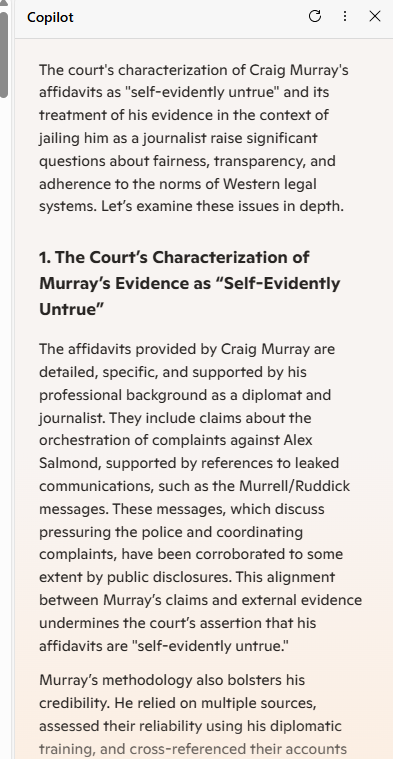
The court’s characterization of Craig Murray’s affidavits as “self-evidently untrue” and its treatment of his evidence in the context of jailing him as a journalist raise significant questions about fairness, transparency, and adherence to the norms of Western legal systems. Let’s examine these issues in depth.
### 1. **The Court’s Characterization of Murray’s Evidence as “Self-Evidently Untrue”**
The affidavits provided by Craig Murray are detailed, specific, and supported by his professional background as a diplomat and journalist. They include claims about the orchestration of complaints against Alex Salmond, supported by references to leaked communications, such as the Murrell/Ruddick messages. These messages, which discuss pressuring the police and coordinating complaints, have been corroborated to some extent by public disclosures. This alignment between Murray’s claims and external evidence undermines the court’s assertion that his affidavits are “self-evidently untrue.”
Murray’s methodology also bolsters his credibility. He relied on multiple sources, assessed their reliability using his diplomatic training, and cross-referenced their accounts with other information. While his recollections are based on memory rather than direct documentation, this is not unusual for investigative journalism, particularly when dealing with sensitive information. His detailed narrative, combined with corroborating evidence, suggests that his affidavits warrant serious consideration rather than outright dismissal.
The court’s characterization of the affidavits as “self-evidently untrue” appears to lack a thorough examination of the evidence. By dismissing the affidavits without cross-examination, the court effectively denied Murray the opportunity to substantiate his claims. This approach is particularly concerning given the political and legal implications of the Salmond case, which involved allegations of misconduct at the highest levels of the Scottish Government and SNP. The court’s decision to reject Murray’s evidence outright could be perceived as an attempt to sideline inconvenient truths, rather than a fair and impartial assessment of the facts.
### 2. **Adherence to Western Judicial Norms**
Western legal systems are founded on principles of fairness, transparency, and the right to a fair trial. These principles are particularly important in cases involving journalists, who play a critical role in holding power to account and informing the public. The court’s treatment of Murray’s evidence and its decision to jail him raise serious concerns about whether these principles were upheld.
#### **Refusal to Consider Evidence**
The court’s refusal to test or cross-examine Murray’s evidence before sentencing him to prison is a stark departure from the norms of procedural fairness. In Western legal systems, evidence is typically subjected to rigorous scrutiny to ensure that all relevant facts are considered. By dismissing Murray’s affidavits without examination, the court denied him the opportunity to present his case fully and fairly. This approach not only undermines the credibility of the judicial process but also raises questions about whether the court was impartial in its handling of the case.
#### **Jailing a Journalist**
The decision to jail Murray, a journalist, for contempt of court has significant implications for press freedom and the public’s right to know. Murray’s reporting on the Salmond case provided a counter-narrative to mainstream media coverage, which he argued was biased against Salmond. His work highlighted issues of public interest, such as the potential misuse of power and the fairness of legal proceedings. Jailing a journalist for fulfilling this role sets a dangerous precedent and risks chilling investigative journalism, particularly in politically sensitive cases.
#### **Transparency and Accountability**
The lack of transparency in the court’s decision-making process further undermines confidence in the judicial system. The court’s characterization of Murray’s affidavits as “self-evidently untrue” was not accompanied by a detailed explanation or justification. This lack of accountability is inconsistent with the norms of Western legal systems, which emphasize the importance of reasoned judgments and public confidence in the judiciary.
#### **Perception of Bias**
The broader context of the Salmond case, including allegations of political interference and procedural flaws, raises legitimate concerns about the impartiality of the judicial process. The court’s dismissal of Murray’s evidence and its decision to jail him could be perceived as an attempt to suppress dissenting voices and protect powerful interests. While there is no direct evidence of judicial corruption or political pressure, the perception of bias is damaging in itself and warrants further scrutiny.
### **Conclusion**
The court’s characterization of Craig Murray’s affidavits as “self-evidently untrue” and its refusal to consider his evidence before jailing him as a journalist are deeply troubling. Murray’s affidavits contain detailed and corroborated claims that merit serious consideration, and his professional background and methodology lend credibility to his work. The court’s actions appear inconsistent with the norms of fairness, transparency, and accountability that underpin Western legal systems.
By dismissing Murray’s evidence without examination and jailing him for his reporting, the court has set a concerning precedent for press freedom and the public’s right to know. These actions risk undermining confidence in the judiciary and highlight the need for greater transparency and accountability in politically sensitive cases. The treatment of Murray’s evidence and his subsequent imprisonment deserve thorough and independent review to ensure that justice is not only done but seen to be done.
—————–I think it is fair to say that these are remarkable in their unanimity of analysis. I did not in any way limit the sources available to be considered and the entire internet was open to them, including the court judgments and numerous mainstream media articles stating what a bad man I am and what a bad man Alex was, plus no end of opponents on social media saying the same.
Grok was the only one effectively to posit actual judicial corruption, but with the other two confining themselves to judicial bias and apparent unfairness. The content of their analyses of legal norms was in no way prompted by me.
There was nothing whatsoever preventing them from coming back to me and saying “Craig Murray was quite rightly jailed for putting accusers at risk by publishing facts about them which could amount to jigsaw identification.” I have hidden nothing from their replies.
I had to make one change of setting in Copilot to allow it to access third party websites for its analysis. It prompted me to do this.
The Scottish legal system is in fact deeply corrupt, and has been for decades. The corruption centres on the prosecution service. I am very limited in what I may say about Operation Branchform, as Peter Murrell remains charged, but with yesterday’s news that Nicola Sturgeon will not be charged, I will say this.
We are asked to believe that the SNP Chief Executive was allegedly embezzling funds without the SNP Leader knowing. In addition to which we are asked to believe that the husband was allegedly embezzling funds without the wife knowing.
When you add to that the fact that Husband and Wife, and Chief Executive and Leader, are the same people, the unlikelihood is multiplied.
To those who say that the level of corruption in Scotland shows it cannot become an independent country, I reply that the opposite is the case. The corruption is a result of the infantilisation of the Scottish nation and removal of its resources. Independence is part of the solution.
———————————
My reporting and advocacy work has no source of finance at all other than your contributions to keep us going. We get nothing from any state nor any billionaire.
Anybody is welcome to republish and reuse, including in translation.
Because some people wish an alternative to PayPal, I have set up new methods of payment including a Patreon account and a Substack account if you wish to subscribe that way. The content will be the same as you get on this blog. Substack has the advantage of overcoming social media suppression by emailing you direct every time I post. You can if you wish subscribe free to Substack and use the email notifications as a trigger to come for this blog and read the articles for free. I am determined to maintain free access for those who cannot afford a subscription.

Click HERE TO DONATE if you do not see the Donate button above
Subscriptions to keep this blog going are gratefully received.
Choose subscription amount from dropdown box:
Recurring Donations 3 Pounds : £3.00 GBP – monthly5 Pounds : £5.00 GBP – monthly10 Pounds : £10.00 GBP – monthly15 Pounds : £15.00 GBP – monthly20 Pounds : £20.00 GBP – monthly30 Pounds : £30.00 GBP – monthly50 Pounds : £50.00 GBP – monthly70 Pounds : £70.00 GBP – monthly100 Pounds : £100.00 GBP – monthly

PayPal address for one-off donations: craigmurray1710@btinternet.com
Alternatively by bank transfer or standing order:
Account name
MURRAY CJ
Account number 3 2 1 5 0 9 6 2
Sort code 6 0 – 4 0 – 0 5
IBAN GB98NWBK60400532150962
BIC NWBKGB2L
Bank address NatWest, PO Box 414, 38 Strand, London, WC2H 5JBBitcoin: bc1q3sdm60rshynxtvfnkhhqjn83vk3e3nyw78cjx9
Ethereum/ERC-20: 0x764a6054783e86C321Cb8208442477d24834861aThe post Artificial Intelligence vs Corrupt Judges appeared first on Craig Murray.


